#character A being infatuated and having a fixation on character B
Text
Same ship, different format.
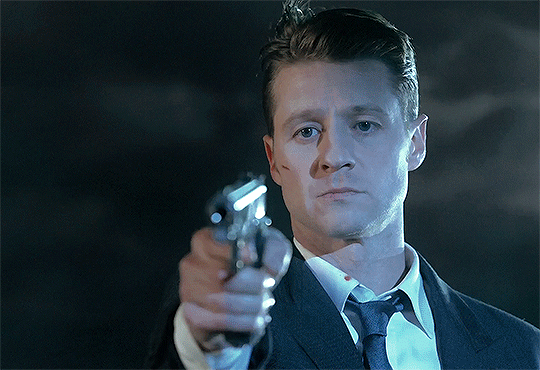
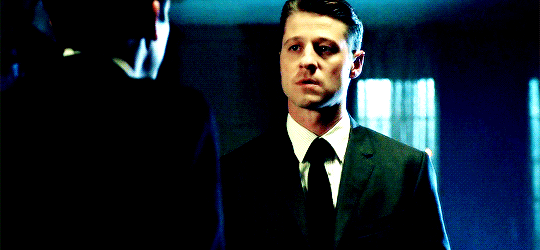

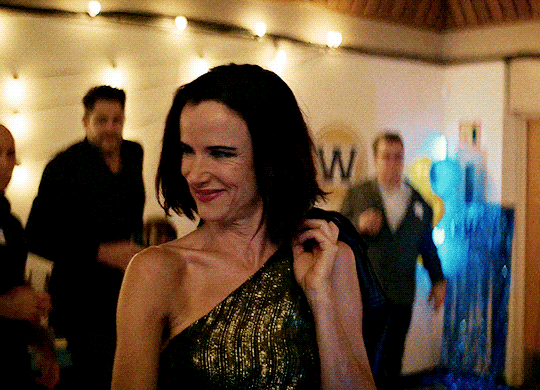
#if you know you know#character A being infatuated and having a fixation on character B#and character B puts up a show of disliking character A despite lowkey being into them#character A encouraging character B's dark side because they don't judge honest ;)#character A being prone to murder people and character B always feeling guilty over the lives of people they couldn't save/had to kill#Gobblepot 🤝 MistyNat#gobblepot#jim gordon#oswald cobblepot#the penguin#gotham#gotham tv#mistynat#misty quigley#natalie scatorccio#nat scatorccio#yellowjackets#gifs are not mine#my post
51 notes
·
View notes
Note
its funny looking between his former fixation (orin) and current one (astarion) and noticing he has a very obvious 'type'. what made him so taken with orin, though? what did he like about her? did he not have any initial misgivings? was he ever concerned she might turn on him?
B)c Please know how happy it made me to finally have someone spell this out lmao. It's absolutely true, at least within the dynamic that DU drow shared with each of them; there are a lot of parallels to be found between Orin and Astarion.
The tough part of this question however, is that I have a very difficult time pinning Orin down. She's easily the most elusive character out of the Chosen, and while I understand this Is likely a consequence of being underwritten, I also see a certain charm in a character who's lack of development is part of their tragedy - whose story is very much about not being allowed much individuality of their own, and having no resolution. I think this is a space worth playing in.
I couldn't tell you what the hell Orin likes, what she was like besides blood-thirsty and deranged. I can barely fathom her sitting down to have a conversation with someone. Think about it - she was raised from childhood in the Bhaal temple, both her parent's were faithful servants and she was essentially groomed from birth to be either Bhaal's Chosen, the Dark Urge's consort, or a sacrificial lamb. Nobody had ANYTHING to gain from allowing her to develop any humanity.
Of course, this doesn't mean she doesn't have any, deep inside. We see glimpses of it in fairly difficult-to-get dialogue regarding her origins during act 3. My very vague take on Orin is that she was a determined and persistent person who learned to make her circumstances work for her as best as she could, who had a strong sense of her boundaries but a horrifically difficult time differentiating between negative emotions - this is why I personally don't even know whether she """"led DU drow on""" our of malice or self-preservation. Perhaps she didn't know either - I think whenever Orin felt sadness, discomfort, anger or even happiness or love, she found a way to turn it into bloodlust and sadism, every time.
And it's in part this elusiveness that would have attracted DU drow. What did Astarion have to do to get DU drow to pursue him? He had to feign disinterest, he had to pull away - the fact that Orin never allowed DU drow to get close enough to truly know her plays a significant part in how unhealthy his attachment for her became.
That said, this was a long game - he did become infatuated pretty much from the moment he saw her when they were both teenagers. This is a much simpler concept to understand - he was profoundly emotionally inept and neglected, and she was probably the prettiest thing he ever laid eyes on, not to mention the only other person in the temple close to him in age.
Truth is, they did have a lot in common on the very basis of having been so thoroughly stripped of their humanities, but It was a closeness born entirely from circumstance - the implied vulnerability in the type of life they shared together, even if they never spoke about feelings or shared what normal people would qualify as a "sweet" moment. They didn't really use their words, and when they did, they were like daggers - twisted murder sibling banter.
But when they had to work together it was very different. They played off each each other like match and friction, like two fitted cogs turning a wheel. There must have been nothing that swelled DU drow's heart more than when they killed together, perhaps even more than when Orin hurt him. He loved seeing her in her element and yearned for nothing more but to be let into the joy she found in it.
He Never had any misgivings. He always thought she would come around (to him) eventually. He was completely and entirely blind to how much her resentment towards him grew throughout the years, how he lost a sister through wanting a lover.
135 notes
·
View notes
Note
Do you have any thoughts on Tiffany becoming Finn and Jake’s brother? Cause I know you ship Tiffinny
i typed up a huge thing but tumblr's new body section kind of sucks ass and deleted half of my post so i have to retype everything and it's not gonna sound as smart cuz im fucking tired so bare with me - also obviously spoilers for "together again" from adventure time: distant lands
thaaaat's the thing i was conflicted about.
see, on one hand it makes perfect sense that margaret and joshua would look at tiffany and want to take him in. and it makes perfect sense that tiffany would be receptive to this and want to be taken in by them. and in terms of wrapping up character arcs, tiffany needed a positive influence to steer him in the right direction after spending most of his appearances being fixated on bad influences and wanting to do the right thing but getting swept up in the wrong crowds and in a setting that explores the after life then there would be no one better than margaret and joshua. to help wrap up tiffany's arc for those who are invested in him, and for how they had chosen to utilize his character for the special, this was the best way to end it with the hope of him being able to improve.
but on the other hand A.) tiffany is a grown ass (albeit also dead ass) man by the time he meets margaret and joshua so its not like he really needs to be adopted (although i'm not really opposed to adults being adopted when theyre orphans who absolutely need those kinds of positive familial relationships in their life) but B.) i think it's conceptually weird for tiffany to be adopted by finn and jake's parents. not because of finn, but because of jake ... and the contextual history of tiffany's presence in adventure time as a series.
1. because tiffany was intentionally designed with an androgynous silhouette and a typically female name so that he could be conceivably presented as someone that jake could conceivably leave lady rainicorn, his girlfriend, for. and this is in fact a plot point, because she is intentionally lead to believe that this is a possibility. tiffany was introduced with the intention of making jake's girlfriend romantically jealous. tiffany never had a shot because he's the same age as jake's little brother, and that's intentional on his part too. but he's still someone introduced in a romantic context in relation to jake.
2. it's almost immediately established that while jake isn't really interested in tiffany and doesn't seem to actually care that much about him... like... at all... tiffany's attachment to jake is more comparable to finn's attachment to princess bubblegum early into the series - one sided infatuation - than comparable to finn's completely platonic brotherly attachment to jake. tiffany resented finn because he had no idea finn was jake's little brother. he did not understand their actual dynamic and was jealous of it.
3. also jake explicitly states he had a crush on the character widely believed to be (and conceptually considered as possibly being,) tiffany's biological dad. which is, idk, not problematic or anything i just don't think people usually crush on the bio parents of those who are or would become their adoptive siblings??? so its just weird to me
but also, 4. finn blushing at seeing tiffany again in the deadworlds, an action he really only ever did in the original series when confronted by characters he was attracted to. that he does in together again. which introduced the plot point of margaret and joshua adopting tiffany. maybe it's just me but actively putting that in and then in the same special going, "oh, they're going to be brothers now!" is... kind of a really weird decision, idk.
also imho i think actually considering finn and tiffany brothers is kind of a stretch because of the context... like, they both lived to adulthood - finn dying at approximately 80 or so years old - without ever having been raised together or considering each other brothers, ever. they had never spent a single moment as siblings, in life or in death. margaret, joshua, finn and tiffany had all died as adults who lived full lives... and tiffany never knew margaret and joshua at any point in any of their lives, and finn is the only one listed who had been actually raised by them.
so their lives had to end - as adults - for them to be thrown into a scenario where they could even theoretically be called brothers, and i don't think they really could be called brothers contextually because even ignoring the life they had before death, there would never be any time for them to actually live in the reality of being adopted by the same couple, or to get used to the idea, or to even begin considering each other brothers - because finn immediately decides to reincarnate. finn ceases to exist as he was known by all those who loved him, and all ties to that life are severed. possibly penny or shermy exist, now. but finn ... finn's just a memory.
but largely, it don't matter. none of dis matters. they're not real and my identity is not dependent on a fictional relationship going the way i wanted it to or how i thought it would, whether the writers shared my opinions or mindset regarding writing fictional characters we're all invested in or not. while i am still conflicted about the plot point for the reasons given, it doesn't really ruin my enjoyment of the special or feel it is any lesser as a finale.
26 notes
·
View notes
Text
General Yandere Headcannons (sfw)
personal headcannons for yandere Shinsou Hitoshi, Bakugou Katsuki, and Kaminari Denki
a/n: reader is a civilian to make things more consistent, also the characters have been aged up to be 18+
_____
Shinsou Hitoshi
naturally, he’d would fall for someone who has no regard for restraining themselves when it comes to talking to him
some would call it reckless abandon, you call it being a decent human being
the warm look in your eyes combined with the sweet sound of your voice as you make conversation lulls him into a deep, unbreakable attachment with you
does his best to hide his feelings for a long time, not wanting to ruin the relationship the two of you share
the last thing he wants is to scare his darling away, refusing to talk to him like so many in his life do
observes stalks his darling from a distance, making sure they get home safely from work or class
watching you depend on him as a hero really gets him going, so he always makes sure to be there whenever you need help
whether it be protection from actual villains or coincidentally running into you at the grocery store, handing you an item off the top shelf you couldn’t quite reach
a devious smirk appears on his face, unbeknownst to his darling, as they slowly become more dependant on him
subtly points out how much they need him, and generally enjoys making his darling a little flustered by their helplessness here and there
a/n: gonna have to make a part two
_____
Bakugou Katsuki
he’d be mad at himself for falling in love, especially over someone so inferior to him
later realizes that it’s because of this that he feels the need to protect his darling, resulting in a strong fixation
makes peace with himself that these feelings aren’t going to disappear and he can’t ignore them, he chooses the next best thing: giving himself peace of mind
abruptly confronts his darling one day and confesses his feelings, perhaps on a date, trying to make it romantic but failing miserably as he’s not the best at expressing himself
comes off as pissed over the whole ordeal, pushing his darling away as they think he’s clearly not ready for a relationship
he’s not patient in the slightest, and being rejected wasn’t something he anticipated
storms off back to his place and comes up with a plan B
not the type to take time and understand what went wrong, rather he pushes through and resolves that his darling is too naive stupid to come to terms with his devotion
doesn’t care how it happens, Katsuki would bring them back home even if they fought tooth and nail against it. after all, he knows how much stronger he is and they would never really stand a chance
his sadistic tendencies take root when it comes to dealing with misbehaviour, but the love he feels for his darling really comes out with aftercare once they’ve learnt their lesson
_____
Kaminari Denki
constant heart eyes around his darling
he’d be kind of awkward about it, but he tries to flirt with them as much as possible, without sounding off-putting or too forward of course
eager to tell his darling how he feels, praying they see him the same way
tries to be the best person in his darlings life, constantly showering them with praise and support. does his darnedest to make his darling fall for him normally
a mix of delusional and protective, Denki would ignore any protests against his behaviour from his darling for a while
eventually though his protective instincts gets the better of him, resulting in an argument over his concern for your safety, along with frustrations as to why you’ve denied his point of view
he’d fret over any possible danger, listing anything that comes to mind in an attempt to make his darling understand how serious the situation is
it breaks his heart when/if his darling rejects him, but he channels it into fuel to come up with more convincing methods to demonstrate the need for concern, along with his devotion
hates the look of betrayal mixed with tears on his darling���s face after they wake up in his home, but reassures both them and himself he’s doing it for their safety
the last thing Denki wants to do is injure his darling, so resolves for punishments ranging from a separate, empty and cold room in the basement for his darling to think about what they’ve done, to smaller things like making them go to bed without dinner
he’d be too caught up in his infatuation and need to keep his darling safe from others to be bothered with the loathsome stares sent his way whenever he enters the room, or how each task is like pulling teeth with how much of a fight they put up
#yandere bnha#yandere mha#yandere bnha x reader#yandere mha x reader#yandere shinsou hitoshi#yandere shinsou hitoshi x reader#yandere shinsou#yandere shinsou x reader#yandere bakugo#yandere bakugo x reader#yandere bakugo katsuki#yandere bakugo katsuki x reader#yandere kaminari denki#yandere kaminari denki x reader#yandere kaminari#yandere kaminari x reader#yandere denki kaminari
430 notes
·
View notes
Text
Unpacking Rebirth!Talia’s Upbringing
Okay so…. Can we talk about Rebirth Talia al Ghul?
People who aren’t familiar with her history, her almost 50 year history at this point, and more importantly aren’t familiar with it in depth often have no idea why it is that Talia fans think that her treatment post Morrison, but even moreso post-Rebirth, is a radical rebranding of the character they’ve known for so long. And I could talk about that, and maybe one day I will, but today I’m going to talk about something different, but related.
I’m going to talk about Talia’s background in Rebirth, how it accounts for her being a dramatically different character than she was in her classic form and whether she’s still salvageable as anything other than a mustache-twirler.
I. The Demon’s Daughter
Let’s be clear: the little we know of Talia’s rebirth childhood is absolutely horrific. Pure nightmare fuel. While their traditional dynamic was troubling and problematic, it was also loving in its way, and Ra’s was controlling of her, while also protective of her. Now, instead, we have this:

This issue has been out for a while, but I haven’t seen anyone really unpack what it is Talia is saying here, because we’re all focused on the stupid swordfight with Selina. But look at what it is Talia is saying and what it means about her upbringing.
Talia is saying that, basically since she was a toddler, she has been physically abused, and forced to fight, by her centuries old swordmaster father. In fact, her very first memory is bleeding from wounds caused by her father. From then on, her life is a fight to survive against her own father, which I’m guessing was pretty damn difficult especially when she was an actual child. And often, when she loses?
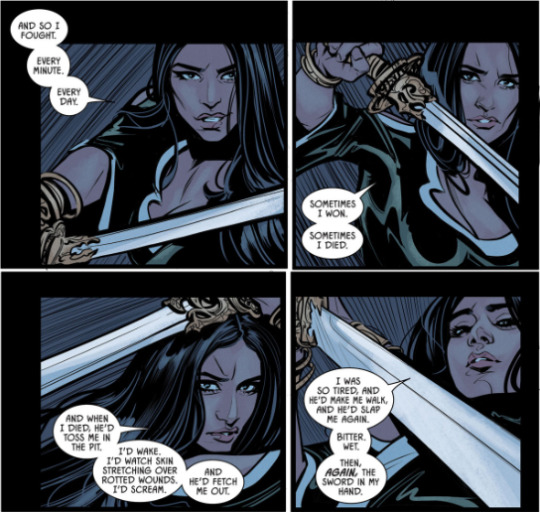
She dies. Or rather, she is murdered. Repeatedly. By her father.
And then he resurrects her and starts over.
And about those resurrections? It’s not like he just picks her newly killed body and immediately brings her back - check out that first panel on the second row. Not only is she killed and revived countless times, he lets her corpse at least partially rot before resurrecting her, so that when she returns to life, she is treated to the sight of her skin regrowing over her rotted flesh. And as soon as Ra’s notices she’s alive again… they start again.
How long did that go on? Unclear, but she’s still fighting him as a grown woman in the equivalent of this time period in The Gift...

...so I’m guessing the answer is “it didn’t stop until she left him.”
To be honest, I’m not really sure what the Rebirth version of Ra’s and Talia’s dynamic even was. The classic relationship doesn’t work at all with this backstory, and we’ve never really seen a lot of what the new paradigm might be since they’ve been out of contact since well before Rebirth. But what we do know is, she was an active assassin from a young age.

Unlike Classic Talia who was actually never an active assassin at all:

We can also glean bits and pieces of information regarding her Rebirth upbringing from other appearances. Over in Silencer, we find out that despite her brilliance, the fact that she was carrying out assassinations for him, and the fact that she could defeat her ancient swordmaster father even as a child, she was never good enough for him:

He was dissatisfied with her, and so he created metahumans using his genes to replace her. Ultimately, this drives her to plot against Ra’s because... who wouldn’t?
It’s not entirely clear what her ambitions were, specifically but judging from this bit of Batman and Robin (New52, but seemingly still canon for Damian’s backstory):
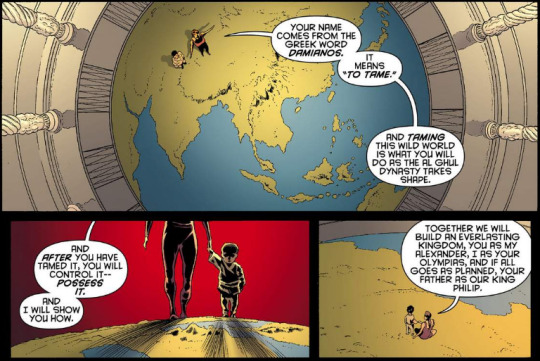
It involved winning Batman over to her side and ruling the world through Damian. This is further confirmed by her comment to Honor in Silencer Annual #1 here:

Where she indicates that Bruce is family to her, and still features in her future plans. What’s strange here is that she also says later that she intends to kill him personally, which is. Weird and out of nowhere, but what else is new. As a sidenote, Silencer is just strange because it ignores everything about Talia’s history not just in terms of changing her personality but in terms of ignoring the timeline of events, but... moving along...
Talia intends to form Leviathan to break free of him and pursue her own agenda. But, while apparently finding her insufficient, Ra’s cannot let her go. Not only that, he actively works to destroy everything she is trying to accomplish, including trying to kill Batman just because she desires him. In fact, he also tries to have Talia herself assassinated:
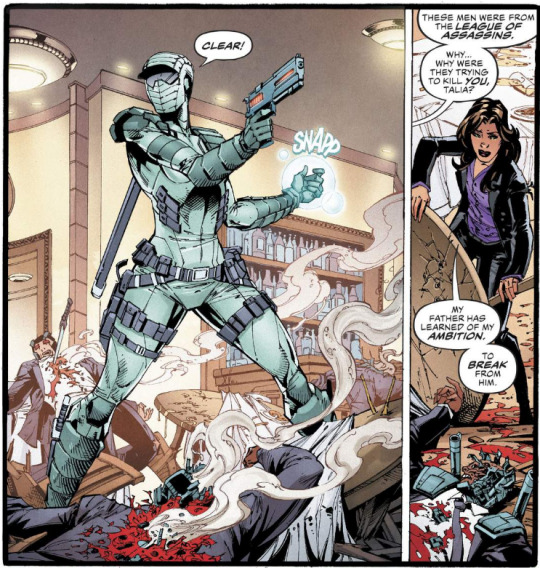
Another thing is, Rebirth Talia is rather older than she looks, as evidenced by her having been an adult when she met Honor.

Which means, in the end, we have a woman who was abused and repeatedly killed by her father, then thrown in a Lazarus Pit (but only after her body has lain around long enough to partially decompose!) and forced to repeat the cycle for who knows how long, but apparently quite a long time - decades, maybe centuries. Who even knows. She’s been working as an assassin since her teens. Despite her excelling and even surpassing him in various ways, he considers her inferior, and begins seeking to replace her with artificially created metahuman heirs. Eventually, Talia decides she wants to break with him, and he responds by first trying to destroy everything she cares about and then trying to have her killed.
OKAY, SO. Nightmare fuel. I genuinely can’t begin to imagine what it would be like growing up in that environment, and under the circumstances it’s certainly no shock that Rebirth Talia is warped.
Even so, what stands out to me in the B&R issue is that, initially, even her wildest ambitions required her to exercise power through a man – it’s just her son instead of her father or her potential husband. This says a good deal about how her upbringing, as well as her father’s fixation on marrying her off, has affected her self-image. And for those who say Talia evidences arrogance and self-importance… yes she does. Which is often a symptom of low self-esteem. In fact even Narcissistic Personality Disorder typically stems from overcompensation for a feeling of worthlessness.
The traditional/original Ra’s/Talia dynamic had some elements of this story, but not all and not nearly to the same extent. Furthermore, Classic Talia had something else - someone else - to love and look to for hope. Rebirth Talia does not. Because as far as I can tell, in Rebirth, Talia and Batman’s relationship has very little in common with the conflicted romance they shared in their original stories. And that’s how we transition to...
II. Beloved of the Bat?
So, Bruce Wayne.
Again, the extent of their relationship in Rebirth is unclear, but it definitely isn’t what it was pre-Rebirth.
The original Bruce/Talia story is basically as such: Talia meets him when she’s kidnapped by Dr. Daark, and falls in love with him. Bruce is also drawn and attracted to her. This results in Ra’s deciding to test Bruce for suitability as Talia’s husband and his own heir. Bruce passes, but unsurprisingly has no interest in running a criminal empire, though he does fall in love with Talia. This leads to a rather intense on/off romance that ultimately results in Damian Wayne, and continues until Tower of Babylon when Talia finally tires of being stuck between her father and her lover and breaks away from both of them. With Bruce and Talia’s relationship having been called to an end (by her, mind you – one day I may do a writeup on Bruce/Talia and how often what happened between them is misremembered by writers and readers alike), Bruce becomes involved with Catwoman in Hush. Even so, we see in Death and the Maidens that Bruce does still love Talia.

Meanwhile, Talia’s previously unknown sister Nyssa kidnaps and repeatedly murders and resurrects her (sound familiar?) until she more or less goes mad. By the end of the ordeal, she can barely speak, and she willing to do anything for Nyssa to avoid being killed again. This results in Talia disavowing her love for Bruce, which seems to be the catalyst for him to finally move on from her, though not without considerable pain.

Okay this is important to run down, because the Rebirth story has changed everything about their relationship.

Gotta love those evil expressions. It helps us remember that she’s a heartless monster.
Anyway so, In Silencer Annual #1, Silencer does note that Talia had previously said she was in love with Batman, so we know that she loved him, okay. But what does love mean to Rebirth Talia? We can find the answer to that if we go back to Roles of Engagement:
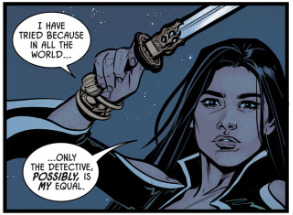
She “loved” him because she considered him a potential equal. That’s not really a bad basis for loving someone initially – and even Classic Talia’s love for Bruce was initially sparked from a place of admiration. But while Classic Talia eventually grew into a more complete love for him, it seems like Rebirth Talia is still stuck on objective: seek worthy mate. In fact, once it’s clear that she and Bruce are not coming back together, she just goes ahead and propositions Slade Wilson because she figures he can give her strong children, too:

Notably, this obsession with strong offspring sort of comes out of nowhere when Morrison takes over, but anyway, from that perspective it’s not hard to understand why Bruce’s feelings for her would also be somewhat muted in Rebirth:
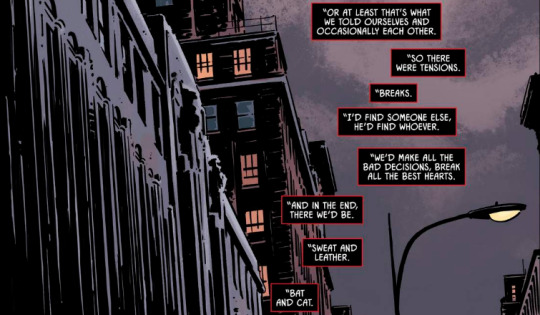
Because while Classic Bruce/Talia was a love story that stretched for over 30 years in our time, and most of their adult lives in canon… Rebirth Bruce/Talia is repeatedly presented as a short infatuation on his end, and a dangerous obsession with genetics on hers. The above panel is from Batman #66, and is part of the Knightmares arc, which is important because while it appears to be Selina saying it… it’s actually Bruce’s thoughts about the women in his life coming out through his imagined version of Selina. And to him, those women amount to nothing much – none of them even warrant a direct callout. Everyone besides Selina is a “whoever.”
Interlude and Sum I
So... Classic Ra’s was controlling, possessive and dismissive of her at times, but he was also devoted, protective and genuinely loving. The relationship was complicated and problematic but affectionate.
Rebirth Ra’s is an abusive tyrant who repeatedly murders and belittles his daughter and, when she decides to break from him, attempts to systematically destroy everything she cares about and then have her killed.
Classic Bruce/Talia was a complicated romance between two people who genuinely loved each other, but were always separated by circumstances. He loved her for years, and she loved him unconditionally, and they struggled over that from the day they met until they permanently separated as a result of her being brainwashed.
Rebirth!Talia went in search of someone she considered worthy of her so they could have a genetically perfect child to conquer the world with. Bruce briefly had feelings for her in a moment between romantic rounds with Catwoman.
My point is this: Rebirth Talia has never experienced genuine love or support from anyone in her life, or for anyone in her life. Her relationship with the two men she traditionally loved, and whose love for her has imprisoned, empowered and defined her for much of her existence as a character, was utterly gutted in Rebirth, leaving Rebirth Talia’s life as a prolonged emotional void. Which makes what comes next remarkable in some ways… and predictable in others.
Because this is where we talk about Damian.
III. Olympias to his Alexander
Now, I’m not going to get into the circumstances behind Damian’s conception because what the whole hell, there is absolutely no consistency there. Various people are very invested in one or another of the myriad versions of his conception that DC has repeatedly retconned and revised, generally leaning to whichever one fits their preferred personal narrative, and that’s fine but objectively? Absolutely no consistency, situation unclear. So let’s just go with “Damian resulted from this mess.”
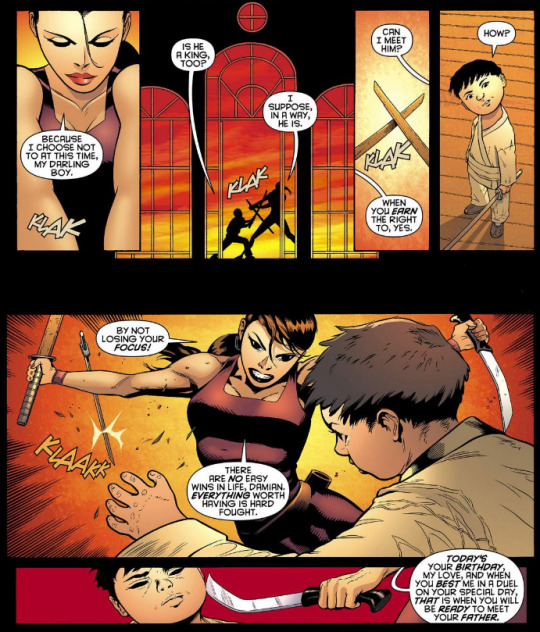
In Batman and Robin #0 we see that Talia basically raised him the way Ra’s raised her… with some major deviations. She used his desire to know his heritage and know his father’s name as the carrot to motivate him to succeed, rather than the fear of death and pain as a stick to punish him for failure.
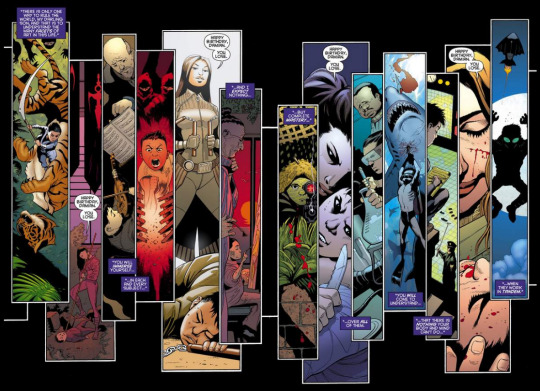
Talia does not kill her son, whom she duels with wooden blades rather than steel. And she is not shown to physically abuse him… aside from the swordfights, which of course is already bad.
Mind you, I’m not denying that his upbringing is still brutal. What I’m saying is, placed in the context of her own upbringing we can see that she was trying to raise him with more kindness and greater love than her father had her – an improved parental style, but still reflective of the only style she, herself, has ever known.
So it’s predictable that he’s essentially mistreated… because she literally has never encountered an emotionally healthy relationship and wouldn’t know how to raise him any differently even if she wanted to.
But it’s also remarkable because despite that, you can see she is trying to be a better mother than Ra’s was a father, and not let Damian grow up feeling unwanted and unworthy the way she did, herself.

Unlike Ra’s, she never tells Damian he is insufficient – on the contrary, she holds him up as the chosen, a conqueror, and dreams of a future when he will lead with both parents at his back. Remember, this is a woman who was never seen as worthy of inheriting Ra’s al Ghul’s organization, and she wants to make sure Damian knows the world is his to hold. The bit about having both parents is important, too, because per Batman Inc, Talia felt deprived of her mother, whom Ra’s had discarded as soon as she was no longer useful to him.
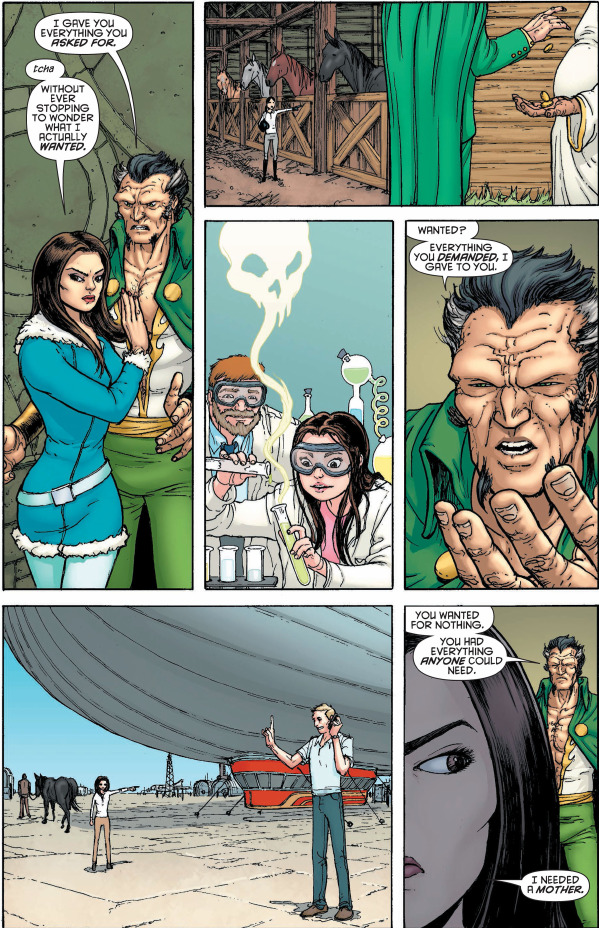
In short, she does for Damian everything she wished Ra’s had done for her.
But, in so doing, she falls into many of the same traps that Ra’s had fallen into: she doesn’t provide what Damian wants, or even what he actually needs. Instead, she gives him what he asks for, and what she thinks he needs. But for someone who grew up without love, trying to understand how to provide it is complicated, and difficult.
Anyway, when Damian finally defeats her, she fulfills her promise and brings him to meet Bruce. This involves a last ditch effort to unite their family: she offers to reform.
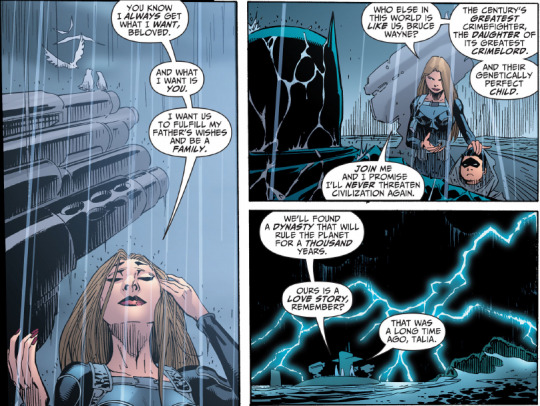
But not only does Bruce reject her, ultimately Damian does, as well.
This is, from Damian’s perspective, completely understandable. Who wants to live that kind of life? But from Talia’s perspective she has now been rejected by her own child, in addition to her father and the man she hoped to spend her life with. You can see the raw hurt this causes her clearly, as a woman who had always yearned for family starts having exchanges like this:
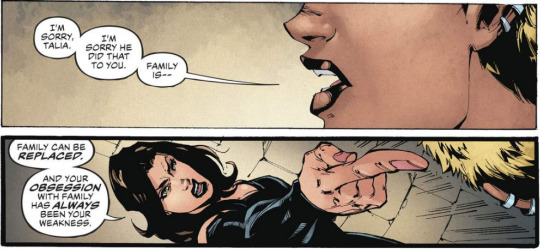
And while we’re at it, count Honor as another person who left her.

And to be clear here, I’m not saying they were wrong to leave her. Rebirth Talia is not a good person, not a kind person, not really anyone I’d want to willingly hang around. And yes, she’s clearly manipulating Honor with her affectionate words, although I’d argue this is largely because manipulation is all she's ever experienced and all she knows how to do.
So, what am I saying?
Interlude and Sum II - Why Is She Like That?
Just to catch it all up, we have a woman who was abused by her father, including being repeatedly murdered and resurrected, treated as inferior and insufficient despite being Ra’s’ equal or superior in many ways, who spent her young life performing assassinations and otherwise conforming her behavior to her father’s demands only to discover he was creating alternate heirs because she’s somehow still not enough for him. She has never experienced love, seemingly has no real understanding of what it is.
When she settles on someone she believes that she loves, she is ultimately nothing to him but a “whoever” - a temporary respite from the yo-yo relationship he has with another woman.
Then Damian happens and, from her perspective, she raises him with all the love, pride and approval that she herself never had. In an effort to unite the family, she also attempts to do what would please Ra’s - conform her behavior to Bruce’s preferences - but he still rejects her.
Meanwhile, she has “adopted” Honor Guest, whom she also shows favor to, but who also wants to leave her, and ultimately does just that, without even saying goodbye.
And then we have some. Quirks in her story - some specifics that really bear looking at in greater detail.
Repeated murder and resurrection: So how bad is that? It’s bad. The first time Talia experiences this kind of thing is in Death and the Maidens, which is probably no longer canon. But okay this was Classic Talia and for comparison, this breaks Talia’s spirit so completely that she essentially becomes Nyssa’s puppet.

She is literally never the same again, even after Nyssa is killed. In fact, it’s this that turned her into the monstrous Talia that we meet in Morrison’s run to begin with, so we already know she can be broken by this kind of treatment… but let’s use another example.
Let’s use… Batman.
He’s got one of the strongest wills in DC, right? Well, lets rewind to a story called Emperor Joker, where the Joker attained Mr. Mxyzpltck’s omnipotent powers which he uses to repeatedly torture and murder Batman and resurrect him every day.

This completely destroys Bruce to the point where the Spectre has to erase his memory of it in order to make Bruce functional as a person again.
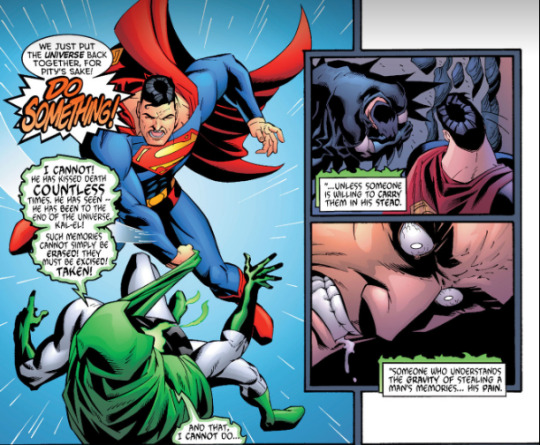
So imagine that happening to Talia, as a child, at her own father’s hands. And not for days, for years. And that’s without even considering the method of resurrection, which brings us to…
Lazarus Madness: Let’s talk about the Lazarus Pit. It’s a magical mystical ley line-powered bath that resurrects and heals. We all know that. But the thing is, that’s not all it does: it also drives the one bathed or healed mad. For a short time, they become superhumanly strong, and also overtaken with violent bloodlust. The first Lazarus pit was used to resurrect a sultan’s son, who promptly murdered Ra’s al Ghul’s wife Sora. Since then, Ra’s himself has been the primary beneficiary of its benefits, with interesting results… namely that Ra’s has been slowly going mad for centuries.

Because even though the intensity of the bloodlust and madness fades, it never completely disappears, and cumulative effect eventually twists a person’s nature beyond recognition. In his first life, Ra’s was a good-natured doctor, but over the many exposures he has found himself becoming progressively worse.
A quote from Denny O’Neil, Ra’s’s creator:
“...we gave Ra’s a benevolent motivation. You can certainly quarrel with his methods ... But Ra's is a loony bird. He’s been alive for 400 years and he’s become a maniacal sociopath.”
Dick Grayson concurs, and acknowledges its cause:
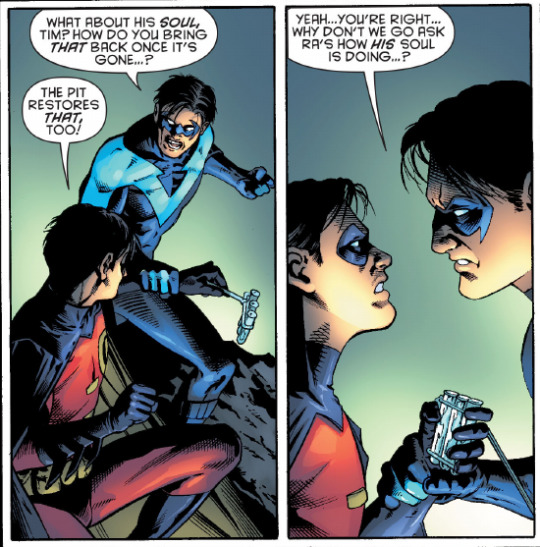
Even Ra’s himself is aware of it – this is why he didn’t want Jason bathed in the Lazarus Pit, because he is all too aware of the demons it stirs in a person.

So, what is the impact on Talia, who is quickly and repeatedly tortured and killed, and then resurrected using a method that is known to drive people insane? I’m going with “not the best.” It’s frankly astounding that she still resembles a human, psychologically.
Assassin work at a young age: While there has been a long-standing debate about the effects of exposure to violence on all people and children in particular, in general the consensus is, yes, exposure does cause desensitization. Obviously this doesn’t mean people are going to generally become serial killers because they played a violent video game, but it does have a numbing effect – just think about how people who watch enough horror films are harder to scare with horror films.
Now imagine that, instead of watching people murder and commit violent acts on television or on film, a child is instead expected to perform said acts themselves. How desensitizing would that be?
Frankly, to see all we need to do is look at Damian, who grew up under similar circumstances and, as a result, initially exhibits what I can only call red flag behavior.



The thing is, Damian isn’t so dissimilar from his mother in this regard. Like Talia, he becomes morally twisted, emotionally empty and ultimately tethered not to his own sense of morality or self but to other people’s perceptions and demands of him and who he should be. Before he meets Bruce, he adheres to the League’s expectations, and when he meets Bruce, he instead aligns himself with Bruce’s code of behavior, even though he does not actually believe in it. It takes a good deal of time and work for him to begin developing his own beliefs and boundaries. The difference between Damian and Talia is that he had Bruce and Bruce, despite his flaws, loved Damian enough to try for his sake.

Arguably, this is a defining difference between Classic and Rebirth Talia, as well. Classic Talia also viewed Bruce as her beacon and her path to salvation and hope.
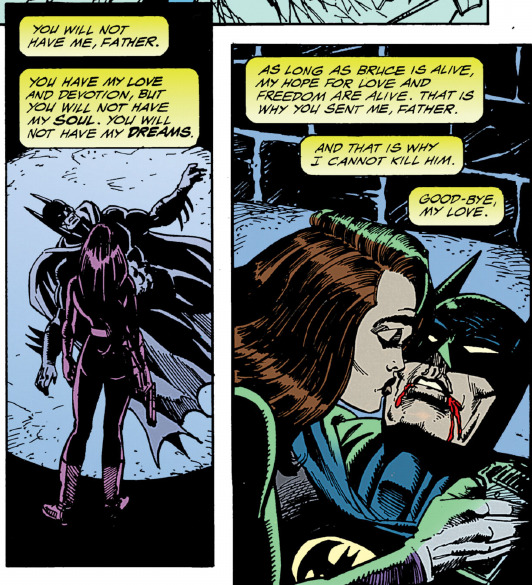
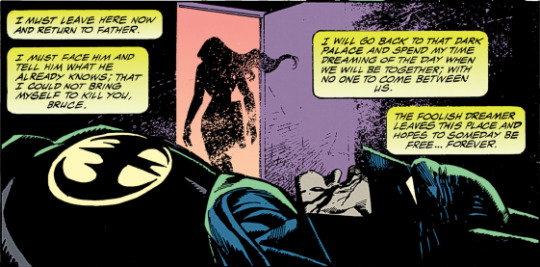
But if, in Rebirth, Bruce never really loved her, and in fact she barely loved him, then there is no catalyst for her to begin seeking another path. Rebirth Talia didn’t have anything but the League, and even Ra’s barely cared for her. As a result, she was boxed into her role by fate, which she acknowledges in Teen Titans, as she wishes better for her son than she had herself.

Anyway, obviously, there are no studies on the effect of taking assassin work as a child, but my general guess here is that she has a twisted understanding of the value of life and the significance of death. Which brings me to another massive issue that permeates the character and may even help explain her choice to put a hit on Damian at one point.
Death as Optional: Death is an inevitability, right? Like taxes. Nothing you do can prevent it, or reverse it, so all you can do is live with it, and make the most of what you have. It’s said that the existence of death is what lends meaning to life, and while I’m not sure I’m quite on board with that, the fact that death is permanent certainly does lend a certain gravitas to it. It’s also the reason we fear death and what lies beyond it.
Unless you’re an al Ghul.

For an al Ghul, death is opt in. Because Ra’s is essentially immortal (which is also a new thing, by the way) and because Talia herself has been repeatedly resurrected, as has her brother Dusan (assuming he’s still in continuity post-Rebirth), to Talia death has no weight to it. No gravitas. It is easily doled out, and just as easily forced into retreat.
Given that, it becomes exceptionally easy to threaten death, even to those she loves, because there’s nothing to say she can’t change her mind and take it back.
Now to be clear, my argument is not that she had the intention of taking it back – she didn’t really intend for Damian to die to begin with for one thing. It’s just that, because of who she is and what she has experienced, Talia would always act with the knowledge that she can choose to endanger someone’s life and think about whether she’s comfortable with the result (their being dead) later.
This is evident in both Ra’s and Talia, each of whom are willing to use death and resurrection as a tool to restructure people they don’t even want dead, as Ra’s attempts to do with Damian and Talia, and as Talia does with Honor Guest.

…as a sidenote can I just say that the Lazarus Pit’s effects are so weird. In some stories it can’t resurrect at all, and in others it can resurrect after decades without a problem. In some it just reduces age, and in some it also heals memories. Here it’s being used to erase memories, which makes no sense since a Pit his how Jason Todd got his memories back. Also, this is the first I’ve ever heard of al Ghuls having especially strong resistance to the Pit’s corrosive effects on personality. Considering it’s just a bunch of chemicals on a ley line, I’m not sure how that would work, but now I’m just imagining Ra’s with a book of Lazarus recipes like, Well, I’m needing one that restores memories today so Ima add an extra pinch of ginko.
ANYWAY.
V. “R” Stands for Redemption
There was a time, a few years back, when Damian had his own series, Robin: Son of Batman. And therein, you see one of the few efforts to explain and redeem Talia’s character. There, while she was still presented as colder and more aggressive than her Classic counterpart, she was still capable of compassion, protectiveness and love.
It was essentially explained as a result of her being cleansed of the toxin that was Ra’s al Ghul’s influence, via having darkness physically removed from her body.

Now, to be honest, I’m not sure how I feel about that particular route – I feel like it would have been more honest to have her resurrection heal the Lazarus damage, for example, but it’s a start. And, in the end, Damian left her with the chance to redeem herself and earn back his and Bruce’s trust.
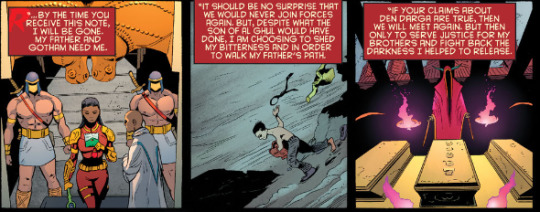


Aaaand she has failed. Or more precisely, writers have failed to follow up on this thread, and have instead doubled down on her as the evil Dragon Mother. I’ll be honest, I’m not really sure what’s going on with DC’s fixation on evil Asian ninja moms but I’m just going to… pretend that isn’t a thing in order to suggest some paths that could salvage her character.
I’ve seen it said that she’s been too evil for too long to be redeemed, but honestly that’s pretty silly. First of all these are comic books, anyone can be redeemed. The same writer who wreaked havoc on Talia also had Magneto, a Holocaust survivor, going full Nazi on humans, which was incredibly out of character, and Marvel basically fixed it by saying “guess who that wasn’t? Magneto. It wasn’t Magneto.” Technically DC could just Hal Jordan her, or let the rumored upcoming continuity shuffle bring her previous history back. As for the “been this way too long” argument, I mean she was Original Flavor Talia for more than twice as long and that wasn’t too long for DC to flip her entire motivation and personality. Catwoman was a villain for decades, and yet here she is, protecting people, making out with Batman on rooftops and leaving him at the alter for altruistic reasons. Same with Ivy, except for the parts about Batman, soooo… you know….
Anyway. I’m going to work with the assumption that we have to use what we have, and that we’re trying to get her to something like her pre-Morrison personality.
The first thing she would need is the experience of love. Someone to anchor her, who won’t judge her or abandon her even when she’s in a dark mood. Even when she’s showing her pain and her anger. Someone who recognizes how broken she is, but decides to try to help her rather than rejecting her. Someone who, in essence, will do for her what Bruce did for Classic Talia, and what he does for Damian in his flawed way.
Now, I’m a massive Bruce/Talia shipper, no lie. However, I do not think Rebirth Bruce and Talia have the kind of connection that could provide her this essential first need. Someone like Superman or Wonder Woman would probably be a better choice, simply because they have greater warmth of character and a drive toward helping lost souls.
After that, she would need some good old fashioned redemption time. Maybe a miniseries where she goes Xena on the world: a redemption quest. Maybe joining a team like the Outsiders or the Suicide Squad where she can earn her way back from the brink. The Outsiders would be cool, especially, because it would allow Bruce and Damian to monitor her and judge her as she progresses.
…and I mean, from a character perspective that’s all she really needs. From a writing perspective, she needs a writer who will nail down things like where Damian came from without going back to the drug-and-rape well, which was a retcon to begin with and has been retconned out and then back in over and over again. And most importantly, she needs a writer who has the interest in exploring her internal world to the point where they can actually draw these things out of her instead of just ignoring the fridge-horror implications of things like… the way she was raised.
If we could get these things to coincide, then Talia, too, can be saved!
Or we could just reboot the timeline again, whatever.
Anyway, that’s all folks, thanks for reading this far, I have no idea how you did. If you’re interested in this kind of thing, feel free to drop me a line and ask me… whatever, because God knows I have plenty to say about Talia and about comics in general.
In closing, something to remind us of the character we’ve lost.


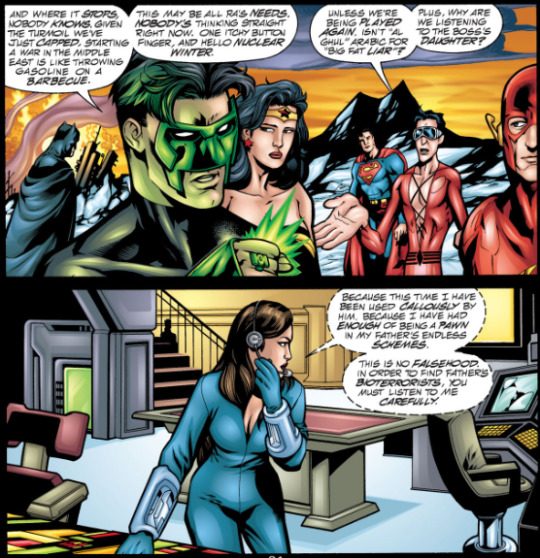

Until next time!
101 notes
·
View notes
Text
God, We're All Tired: Female Conflict in Killing Eve's Season One Finale
So I'm sure 1x08 has been analysed to death, but seeing as we're winding up to the end of Killing Eve's second season (sad face), I thought I'd jump in with a completely unsolicited reflection on the ultimate culmination of Villanelle and Eve's mutual obsession and pursuit.
I'll kick off by saying that from the start, we knew this moment would be interesting, for a whole slew of reasons:
Firstly, from the get-go, we were shown that Killing Eve was here to subvert and reconstruct; it's deeply oriented within its genre, but it's irreverent, and even what I would describe as a reclamation of spy-fi. Specifically, it's a female-led narrative taking ownership of a set of texts and tropes that have consistently objectified and excluded women by turns. From its inception, the psychological thriller genre has delighted in a) withholding women's agency, and killing/torturing/assaulting them, both to shock viewers and to lend pathos to the motivations of male characters, and b) revelling in their "expiration" from sexual desirability, and casting the "ailing crone" as the villain orchestrating events. Killing Eve has absolutely no interest in ever reducing its women to their component parts. There are no pedestals, and there are no pitchforks. As a show, it hits all the golden points of suspense television, and completely reimagines the rest; it's a masterpiece balacing act of keeping the classic cat-and-mouse recogniseable, while allowing Eve and Villanelle to each be both the predator and the prey.
Secondly, our two protagonists are women. Highly unusual and exceptional women -- that's inarguable -- but nevertheless, they've been socialised in particular ways. What's so fascinating here is that both have been injected with a comfort in and enjoyment of theatrical violence that's usually reserved for male villains. However, even at their most ruthless, there's an innate intimacy to both of them -- unlike, say, for example, the Joker, Villanelle's flamboyance and love affair with destruction never manifest as mass-killings or the eradication of infrastructure (like blowing up a hospital). Villanelle exacts each murder with the creativity of the truly engaged and passionate, but it's always personal and unique, usually one-on-one. She doesn't have a vendetta against the world, either; she finds beauty in it -- in ice-cream and movies and nice architecture or fun clothes. Similarly, Eve is enthralled by Villanelle's flair for the deadly and the dramatic, but it's not born out of a spite for humanity, but a sense of artistry and a consuming need for some adrenaline in her otherwise numb and mundane life. These complexities muddle their emotions and motivations, and make it difficult for even the most television-literate to semi-accurately predict their storylines.
Thirdly, Eve and Villanelle are never positioned as diametrically opposed. This in itself is not exactly out of the left field -- a lot of media with a dark focal point or mature subjects introduce heroes and villains who share key traits (e.g. Sherlock and Irene, in CBS's Elementary), or even comparable goals (e.g. Black Panther's Killmonger and Nadia both want to open Wakanda's borders). In most cases, though, the antagonist will represent some kind of seduction to the 'other side', that the protagonist inevitably resists the allure of (e.g. Andy realising Miranda isn't who she wants to grow up to be -- successful but alienated -- and goes back to her excuse of a boyfriend in TDWP). But while Eve and Villanelle are very much established as one another's temptations, we also see that they'll grant the other access to a part of the world that is, for now, barred from them: Villanelle and Eve will stop each other from being bored. They "resist the allure" not because they fear moral wrongdoing, but because they cling to their respective images of themselves -- Eve, as someone "nice and normal", who happens to have a grey area for a hobby, and Villanelle, as someone independent, in control, with no lines she wouldn't cross.
Way back in the pilot, we're shown that they don't actually WANT to destroy each other. Villanelle is too interesting to Eve, Eve is too attractive to Villanelle. Yes, they pose a significant threat to their respective lifestyles, but as we've had proven, they're becoming willing to risk that if it means gaining something more. They don't reflect a sinister alternative timeline of "look what you could've been" (which is inherently hero-centric, and Killing Eve pays as much attention to Villanelle as Eve), they offer each other a "look what you could still be", that is at once dark and hopeful -- something that they've really elaborated on in this second season.
But 1x08, even though it is very much the symbolic collision that is the centrepiece of all chase stories, is not their first meeting. Villanelle goes to Eve's house in the (iconic) 1x05. So why not save that for the finale? Why not build and build and have that tension released right at the end? Because, crucially, 1x05 generated more tension. The show's writing is so substantial that it doesn't worry about losing its audience after the moment they've been waiting for happens. It's one of the reasons you could have the entire plot of Killing Eve spoiled, and then still enjoy every episode when you watch it yourself: it's the How that we love as much as the What. Killing Eve takes the time and space to revel in its style, characters, and setting -- but that's another essay.
In 1x05, their meeting is high-octane, and crucially, it's brief. We get a snapshot of how their infatuation and fixation translates into chemistry. And they both become real to one another. Eve's last reservations begin to fade as she realises that she can survive an encounter with Villanelle, and her sense of self -- most importantly, the subconscious idea that she's somehow special -- is vindicated (Eve's slight narcissism, and how the show makes it compelling and intoxicating, is yet another thing I could go on about). For Villanelle, Eve is allowed to be more than just great hair and a worthy threat. She's someone challenging and entertaining. What's so incredible about that first meeting is that it's proof that this dynamic isn't running on mystery and fumes. It's sustainable. They continue to appeal to one another once they're in the same room together. They appeal even more. Their sexual tension skyrockets, and the whole dance becomes extremely personal. They can't write one another off as playthings, although they largely continue to attempt that, at least for a short while.
With this in mind, let's move on to that finale. Not only is Eve trashing Villanelle's apartment hilarious, and a perfect articulation of the humour/danger cantilever that makes Killing Eve awesome, but it provides a critical catharsis for the audience before the actual confrontation. By this point, the price for Eve's obsession is starting to rack up -- her job is circling the drain, Niko's dodging her calls, her self-image is blurring. Eve has a whole lot of feelings, but she's allowed to express them on her own, symbolically taking them out on Villanelle by ruining her things, which become a vehicle for venting her frustrations without actually affecting their relationship.
When Villanelle does arrive, Eve's ready. This scene would've worked if it was some sexy wall-leaning, banter, and Eve surprise-stabbing Villanelle in the middle of a conversation. I think that's probably how a lot of screenwriters today would've done it, scrawling it off by rote and relying on Villaneve's chemistry and Comer and Oh's excellent acting to nail the bit. Instead, we get this civil conversation, and then they lie down together, first relaxing, and then gravitating towards one another. I don't believe that Eve knew until the millisecond she decided to do it that she would actually try and stab Villanelle.
I actually gave this mini-essay a title, and it's "female conflict". That's because I think that this entire sequence wouldn't have happened in a show created by men, or featuring male characters. In violent shows, we get violent conflict. Killing Eve is unquestionably a violent show, but it's distinct from its contemporaries in that the characters aren't there to prop up the violence; the violence is there to reveal and develop the characters.
But after a whole season of elaborate murder and tyre-squealing pursuit, we get this stillness. Yet, it doesn't feel for even a beat like bathos. It's absolutely a climax, and it's both suspenseful and arresting. It really illustrates that the show is about fascination: they're hungry to know everything, like Eve says. There's no performative combat. We can't guess what's going to happen because neither can they. Their obsession isn't a "this town ain’t big enough for the both of us" situation. It's a "this town is only the both of us". Their worlds are reduced to each other and they don't want to squander it with fighting, because fundamentally, Eve and Villanelle are so much more similar than they are different.
Again, I say this is so fitting for female characters because they see this co-existence as an option. It's so simple, but the idea of your protagonist and antagonist sighing, "Fuck, can't we just have a lie down after all this?" and making it satisfying is incredibly radical. Because it's so personal, and intimate, and human. At every interval, the writing asks, What would we actually do at this moment? Not, What precedent has popular culture set for this moment? Too often, I think we give characters responses that we've seen before in texts, because we watched/read it, accepted it, and just filed it into our own work, knowing it's what the audience expects. But this scene with Eve and Villanelle is so heart-wrenchingly in-character. It's two people charging at each other full speed, not to hit each other but to be close to one another. And like so many other tiny beats over the course of the season, Killing Eve luxuriates in this proximity.
We get to breathe. It's gentle. It's a gentle pause between two people who could utterly eradicate one another, but choose not to. It's ladden as well with such a specific but familiar kind of exhaustion, and it's an act of defiance, too. Killing Eve rejects the hegemonic (and predominantly masculine) cultural assertion that conflict (or even sometimes, in the less typical texts, debate and negotiation) is the way to resolve difference, and indeed, that difference must be resolved. That one must overpower the other. That your enemy is an alien and cannot be connected with, related to.
The fact is, a lot of even this first season isn't spent chasing, it's spent running. Eve and Villanelle take an interest in each other early on, and it quickly escalates from intellectual to sexual to emotional (insofar as either of them are capable of that). By 1x05, they've caught up to each other. The rest of the time, though, they're fleeing from how much they want each other, how alike they might be. And in Villanelle's Paris apartment, they concede: I love you more than I hate you. I need you more than I should.
And it's with that concession that we as an audience can experience their relaxation, too. It's what we've -- consciously or not -- been waiting for. That acknowledgement.
But Margot, you say, you've been talking about how this isn't about violence -- have your forgotten that Eve STABS Villanelle, literally three seconds after this?
I have not, The Only Follower Who Read This Far. So why engineer all this, and then have Eve knife Villanelle straight in the gut?
Because even though they have this liminal second together, their story isn't resolved. Killing Eve goes absolutely wild with power dynamics, and I could discuss that for hours, too -- Eve is older, but Villanelle is more experienced; Eve is more stable, but Villanelle is more adaptable, etc. But generally speaking -- partially because Eve is, at the beginning, something of an audience surrogate -- the scales are in Villanelle's favour. She's dangerous, clever, has no fear of legal consequences, and has more freedom and greater resources.
Killing Eve is allergic to any pedestrian predictability, so it shakes up this arrangement. In stabbing Villanelle, Eve proves to both of them what she's capable of. Prior to this, they had an impression of their similarities, but this throws into sharp relief exactly how deep those run. Eve immediately regrets the stabbing, because it wasn't about getting rid of Villanelle. She doesn't want to hurt her so much as show her that Eve has power too, has recklessness too, can keep up.
This interaction isn't the product of an inability to relate, but a desperation to connect. This joins them together, affirms their relationship. Eve isn't trying to dominate her, to win, not really. She's telling Villanelle what she's capable of, and equating them. We get this confirmed in how Villanelle perceives in the stab wound as a symbol of affection (2x02, 2x05), and how Eve says she continues to think about it constantly (2x05).
I believe that while Villanelle always respected Eve, if Eve hadn't stabbed her, Villanelle would've remained confident that she, quietly, had the upper hand. That if ever need be, she could be more cunning and cruel and decisive than Eve. But Eve's put them in the same ring, and also removed one major wall between them -- Villanelle's murderous side is a key part of her character, and after this, she knows that Eve isn't intruiged by her despite this, but because of it, and because it’s at least partially common ground. Eve isn't Anna (another comparison I could go off on a tangent about, but I'll spare you).
In sum, I think that the season one finale was beautifully rendered, and reflected Killing Eve's appreciation of itself. It let the characters interact genuinely, it refreshed their dynamic, and allowed them development separately (Eve's new understanding of her own capacity for harm; Villanelle's new experience with vulnerability, and not being able to predict others) and together (intertwining them irrevocably, further aligning them). It's one of those rare scenes where it's completely surprising at the time of viewing, but in hindsight, seems inevitable, and you can't imagine it any different.
I can't make any predictions for the season two final episode other than I expect something equally unexpected, something just as loyal to the characters and their relationship, and their capacity to embrace and antagonise each other.
This essay is probably borderline incoherent. It really got away from me. I set a timer for half an hour and told myself that whatever I got written in that time, I'd post. Thanks so much for your kind comments on my rant yesterday, and I hope this is at least vaguely what you were looking for, @ the people who said they'd read another. You're my favs.
If you've got something else Killing Eve-related you'd like me to yell about, let me know! Or if you want to come chat, I promise I'm friendly! I’m using the tag “#villainever writes” for this rambly stuff atm, so if I ever write another of these I’ll have a digital drawer to put it in hahah
#villainever writes#villaneve#killing eve#killing eve essay#ke analysis#killing eve analysis#villanelle#eve polastri#eve x villanelle#eve x oksana#villanelle x eve#villainever#villanevest writes
132 notes
·
View notes
Text
Series Behind the Scenes (Diablo: Amor Aeternus)
I wanted to share some of the fun hidden eggs/did you know/lore reference/extra stuff that appears throughout the series, but I didn’t have a chance to mention as I posted.
LONG post: content after the break! (Also, series spoilers. In case that’s not obvious.)
In All Things Light and Dark
Water imagery: all the Aspects have an element associated with them. Wisdom/Death is water/ice, per their arcane spells and the domain itself (Pools of Wisdom). Malthael returns to life in a spot that reminds him of the Pools.
Biscuits are the first food Malthael ever eats. He likes them afterwards because they remind him of the warm compassion he was shown. This carries on into later stories, where he has an obvious preference for baking, but also a lingering soft spot for biscuits in particular.
Fallen angels carry with them some sort of lingering power. One of Mal’s most important but not really mentioned ones is that he can speak/read all languages. It’s about 50% practice and 50% magic. He just knows what things mean.
I probably should have had ice manifest on his hands in the church instead of the arcane glow. However, I also wanted to underscore the difference between his base element/person and the Reaper.
The blades themselves aren’t the cause/fix of his memory loss. He’s suppressing things due to a) an extremely painful death and b) his mortal brain trying to reconcile things with his previously immortal/corrupted soul. His taking up the blades and recovering the past through combat is purely symbolic.
Things Malthael does in the year before Tyrael finds him: scribe, translator, and at-no-pay demon cull-er. He spends his entire savings to buy Talm the farm sickles.
Tyrael and the companions probably overreact when they see Malthael, thinking he is a Reaper. But he also is super grungy looking and his clothing is all tattered. He’s been sleeping on the streets when he hasn’t been working at the church. He doesn’t look that far off from a corrupted Reaper.
The reason there’s a punisher in Salvos, and a demon swell in general, is because (you may have guessed it) another angel Fell near there, and is now living there. You see undead when Tyrael falls and his angelic power causes chaos. Any remaining Reapers come out of their fugue state and gravitate towards the lingering essence of their master...who is not really impressed to see them.
This does get mentioned elsewhere, but yes: they all drink the mead. They all get extremely drunk. Malthael and Tyrael get dragged into the farmer’s hand-to-hand just for fun fight and end up smacking the snot out of each other for catharsis.
Arcane & Apples
This story came about because I wanted to write a fun one-shot about how Tristram would appear to an outsider.
Also, I felt bad there was a lack of scholarly characters in the series after Cain dies and wanted to bring someone else in.
Farah was originally meant to be an Archivist (based on the April Fool’s content in the game) before I canned that idea, because I have plans for that later that are very different.
Osseus’ name was one he took when he became a proper necromancer. It derives from “ossuary”, or a place where the dead are kept (bones only).
Farah had a cat for most of her life in Caldeum, but she was currently without one or she would have likely brought it with. You see a few cat references from her throughout the series.
Aya and Tyrael were more than a little hoping that Malthael would strike up a conversation with Farah. They were just dodging around the topic most of the time.
Aya almost barfs when Farah sniffs one of Malthael’s journals. She says she doesn’t know where it’s been, but she has ideas from what she’s seen.
Originally Osseus was going to be Xul, until I learned that Xul was the Diablo 2 necromancer. Part of this carried over to my description of Osseus having a rather charming voice, which is more like Xul and less like the actual Diablo 3 necromancer. I’m chalking it up to artistic variance.
The unreadable scrolls about scroll-crafting are going to be important in Series 2.
The prophetic line from Farah’s dream about Malthael ("This man walks the crossroads. One path leads to ruin. The other, survival.") is meant to read as applying to the survival of the Nephalem (or himself), but it also applies to his decision about the Arch in Act 4.
Farah reacting to the tone of Malthael’s voice (beyond just basic surprise) was added in after several edit rounds, when the characters decided they had this Love thing going on in later stories. Still, I wanted to keep it relatively understated.
The "Aya, would you explain mortal courtship?” line was in the very first draft and was meant to be a humorous throw-away line, but, you know. He still doesn’t understand mortal courtship.
A Light in the Darkness
Most of the first scene was added in the final edit draft, because I wanted to up the banter between all of them.
Lyndon and Malthael pretty much subside by insulting each other, like the not-quite-brothers they seem to be. Tyrael is mostly relieved it’s not him dealing with it anymore.
There’s a small suggestion that people have been beaking at Farah for her being kind to Malthael, and this is true; he’s not making that part up. But they try and not whisper about it if he’s around because he would end them. He finds out anyway.
Lyndon isn’t bugging him for that reason, he really just likes pushing his buttons and doesn’t have anything against Farah or them all getting along.
Unlike Osseus, Zaira never changed her name. It’s hers. It’s who she is. That pretty much sums her up.
Zaira happened because I wanted to write a morally grey/lesser evil human character who was nonetheless on the side of good. Sort of like Malthael when he’s the Reaper.
Zaira’s unhealthy fixation that Lyndon mentions has been mentioned on this blog a few times and implied in the story. She is obsessed with learning more about the Reaper of Westmarch, and admires him greatly. Also, had a really weird infatuation with his power, which is what led to her and Osseus breaking up.
Chith never got far enough to even talk about adopting a new necromancer name.
Chith was named by my husband, when I asked him to come up with a name for a necromancer. He thought it was for Zaira’s character, who we’d chatted about in concept awhile earlier. Nope.
The book lady really has no idea she just called the oldest being in creation “young man” until after it happens.
The book lady is also important and is going to be reappearing later in Series 2.
The bit with Malthael arguing with the Reaper part of him (mentally) during the big gem-fight was added in much later, as part of a sweep I did across the series to build up that conflict for his character, as well as establish the level of PTSD flashbacks he experiences.
Born of Night & Beams of Light
This was originally meant to be the second large story in the series, and come fairly closely after “In All Things Light and Dark”.
The idea for the Archshards happened way before Diablo: Immortals and the Worldstone Shards were announced (my reaction to that probably makes more sense now).
I had planned on making Imperius the antagonist for this story from the beginning, based on his character development in Diablo 3.
Originally, the Prime Evil was going to take more complete control of Imperius, and his form was going to reflect that. But I didn’t think a character as strong as Imperius would give in that much, and that a lot of his behaviour would be due to his own issues and not the influence of the Hells.
The “charger” Tyrael rides in the opening chapters is a reference to Tyrael’s Charger from Heroes of the Storm.
I had notes for the scene in Salvos with Malthael drafted while I was writing “In All Things Light and Dark” because I knew he was going to be revisiting Death.
Talm and his family were originally slated to die in Salvos, but I thought Malthael bringing them back alive would actually have a more positive impact on his character, plot-wise. I wanted him to draw on Death out of responsibility instead of despair.
Malthael’s Death abilities (while mortal) are inspired by the frost magic he uses in Reaper of Souls, as well as by some of the magic the necromancers use in the game series. His Wisdom Aspect form is mostly intellectual abilities (scrying with the Chalice, languages, etc.); his Death Aspect is mage-ish.
The “mental connection” Malthael and Farah use is inspired directly by what Tyrael does with Leah in Diablo 3 in terms of imparting memories and feelings. The mortal angels seem to be at least partially psychic.
A lot of Aya’s character development in the series was inspired by me wanting to write a) a more HUMAN Nephalem and b) how a Nephalem would handle having imposter syndrome. (Since the Nephalem in the game are essentially unflappable.) It is a slight departure from the game characterization, but also my attempt to bring some realism to an overpowered character class.
Originally, Auriel wasn’t supposed to recognize/learn it was Malthael stealing the Chalice until after it was all done, to show that she was willing to help the humans specifically. But the scene ended up being very emotional and affecting and I left it as I wrote it, with her finding out his identity right away.
Auriel’s fate was somewhat undetermined, but I knew she would oppose Imperius. When Chith came about as a character, I decided to have her become mortal instead of dying because I wanted to be able to write a student-mentor relationship between them.
Itherael was plotted to die from very early in the series planning, due to the nature of the Prophecy of the End of Days. Unfortunately, for everyone who is a fan of them.
Auriel’s mortality is one of the more self-indulgent items I wrote into the series, mostly because that could have gone so many different ways.
I really wanted to explore Chalad’ar’s uses, particularly since it seems to be so powerful but isn’t really explained much even in Storm of Light. There’s a lot of suggested functionality, intentional or accidental, with how the user can interact with what they are studying.
Farah helping Malthael with the scrying was a relatively late addition to the story and didn’t appear until I began to write the scene.
Farah’s Nephalem abilities actually extend beyond the Sight, but aren’t fully developed yet -- though they are hinted at when she is able to tolerate Chalad’ar better than some of the others. This will be developed more in Series 2.
My description of the Chalice use/scrying was written before I read “Storm of Light” and ended up being surprisingly close to canon. I had to change very little.
All the various Nephalem classes from Diablo 2 and 3 are represented in the final battle, though not all are named characters. Some of the unnamed Nephalem will be appearing in Series 2 as “new” characters.
The final battle takes place somewhere in the Fields of Misery.
The “Death Knells” described by Chith are a reference to Auriel’s Heroes of the Storm ability that lets her see the “souls” of the dead in order to resurrect them with her ult. This idea will be expanded on in Series 2.
None of the end-battle deaths were planned ahead of time except for Imperius. I let the battle write itself fairly organically and saw what came out of it.
Malthael sees as much in the Caverns of Terror as Tyrael does. Imperius is correct when he says he is thinking about Farah: one of the visions he has is of her telling him that he has disappointed her (which, thanks to some of the mind-to-mind conversations they have had, he does not believe).
The arcane abilities that Aya unleashes on Imperius at the end of the fight are a reference to the wizard’s archon mode in the game. And like in the game, they are taxing and have a cool-down period.
We don’t see Kormac return as one of the souls that Malthael works with, because he is “ready to die” and at peace with how he goes out. It’s in many ways the ideal death he wanted to have as a warrior.
In the original outline I did for the series, Malthael was scripted to die at the end, ensuring Imperius could be defeated. I had a change of heart as his character developed throughout the series, and his redemption occurred in very different ways than I had planned.
Lyndon saving Malthael from death was not scripted at all, but when I started writing that part, it came about naturally. I went back and built up stuff with the two of them for the entire rest of the story to set it up, character-wise.
Malthael is meant to be the “brother” that Lyndon actually manages to save, vs. the one that he didn’t.
The bit with Farah waiting at the water is an accidental but direct mirror/echo of the opening story, where Malthael washes up on the lakeshore. More overt references to this were added in after the draft was completed.
There’s a lot of unwritten material that happens during the Epilogue, including lots of conversations between the characters, patching up, the wake/celebration, etc. This may be material I write and refer back to later, but I didn’t want to include it in the Epilogue because there is so much of it.
I hadn’t actually planned on getting Tyrael and Aya together until I wrote the Epilogue and it just sort of happened. Again, lots of additions/tweaks went into the story earlier to help set it up more overtly.
Malthael hasn’t actually been sitting on that bench for that long. He doesn’t specify when he leaves Farah to go back home.
Tales from Tristram
I wrote “Echoes” about 3 times partially, and scrapped each version, because I thought the chapter kept backtracking on Malthael and Farah’s character development from “Arcane & Apples”. The published version is the 4th attempt.
“Echoes” is also the first time we see Malthael’s PTSD manifest from his POV, post-memory recovery.
"Echoes” also gives the details of him working through the PTSD after fighting himself in Act 1, including some subtle references to the very annoying inner (anxiety) monologue he has.
“Night of Souls” was me writing a Halloween story and accidentally stumbling on pivotal character development for pretty much everyone.
Malthael’s comments in “NoS” about Wisdom angels stargazing is related to the description of the Pools. Even when they are pure they are said to show Balance, and I assume if you went high up enough in the Heavens you would eventually see the stars. It’s an interesting visual balance between light and darkness and very fitting of his role.
Malthael arguing with himself while sitting at the bonfire in “NoS” is an example of how he handles his anxiety when he’s in better control of it; the devil’s advocate voice is a lot more nuanced, and he’s more than able to tell it to be quiet.
“Justice and Wisdom Walk into a Bar” was the original plot idea behind “A Light in the Darkness”. Zaera-d was telling me a story about their DnD group burning down a tavern and I thought it was something the Tristram gang would do. Only they ended up not doing that in Act 3.
The above chapter was also the only real time in the series that Tyrael and Malthael’s sexualities get mentioned directly (though Lyndon hints at Malthael’s in Act 3); I really had to balance it being a humorous scene without actually making fun Tyrael because that was 100% not my intent.
#diablo: amor aeternus#my writing#behind the scenes material#long post#some fun stuff for you to read#a little insight into the stories#i'm sure there's stuff i'm missing#but this is a sample of some of my notes and related things
8 notes
·
View notes
Text
Fiorenze’s Flaws
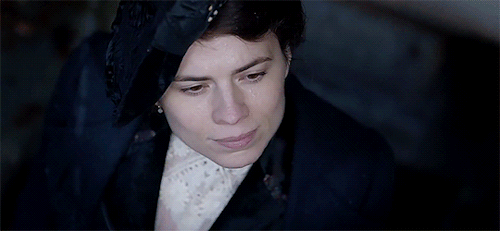
Tagged by: @littlereaver!
Bold what applies to your character.
*Italics for somewhat / sometimes.
Absent-minded - Preoccupied to the extent of being unaware of one’s immediate surroundings. Abstracted, daydreaming, inattentive, oblivious, forgetful.
Abusive - Characterized by improper infliction of physical or psychological maltreatment towards another.
Addict - One who is addicted to a compulsive activity. Examples: gambling, drugs, sex.
Aimless - Devoid of direction or purpose.
Alcoholic - A person who drinks alcoholic substances habitually and to excess.
Anxious - Full of mental distress or uneasiness because of fear of danger or misfortune; greatly worried; solicitous.
Arrogant - Having or displaying a sense of overbearing self-worth or self-importance. Inclined to social exclusiveness and who rebuff the advances of people considered inferior. Snobbish.
Audacious - Recklessly bold in defiance of convention, propriety, law, or the like; insolent; braze, disobedient.
Bad Habit - A revolting personal habit. Examples: picks nose, spits tobacco, drools, bad body odour.
Bigmouth - A loud-mouthed or gossipy person.
Bigot - One who is strongly partial to one’s own group, religion, race, or politics and is intolerant of those who differ.
Blunt - Characterized by directness in manner or speech; without subtlety or evasion. Frank, callous, insensitive, brusque.
Bold - In a bad sense, too forward; taking undue liberties; over assuming or confident; lacking proper modesty or restraint; rude; impudent. Abrupt, brazen, cheeky, brassy, audacious.
Callous - They are hardened to emotions, rarely showing any form of it in expression. Unfeeling. Cold.
Childish - Marked by or indicating a lack of maturity; puerile.
Complex - An exaggerated or obsessive concern or fear.
Cruel - Mean to anyone or anything, without care or regard to consequences and feelings.
Cursed - A person who has befallen a prayer for evil or misfortune, placed under a spell, or borne into an evil circumstance, and suffers for it. Damned.
Dependent - Unable to exist, sustain oneself, or act appropriately or normally without the assistance or direction of another.
Deranged - Mentally decayed. Insane. Crazy. Mad. Psychotic.
Dishonest – Given to or using fraud, cheating; deceitful, deceptive, crooked, underhanded.
Disloyal - Lacking loyalty. Unfaithful, perfidious, traitorous, treasonable
Disorder - An ailment that affects the function of mind or body. (malignant narcissist, former kleptomaniac, obsessive-compulsive ) See the Mental Disorder List.
Disturbed - Showing some or a few signs or symptoms of mental or emotional illness. Confused, disordered, neurotic, troubled.
Dubious - Fraught with uncertainty or doubt. Undecided, doubtful, unsure.
Dyslexic - Affected by dyslexia, a learning disorder marked by impairment of the ability to recognize and comprehend written words.
Egotistical - Characteristic of those having an inflated idea of their own importance. Boastful, pompous.
Envious - Showing extreme cupidity; painfully desirous of another’s advantages; covetous, jealous.
Erratic - Deviating from the customary course in conduct or opinion; eccentric: erratic behaviour. Eccentric, bizarre, outlandish, strange.
Fanatical - Fanatic outlook or behaviour especially as exhibited by excessive enthusiasm, unreasoning zeal, or wild and extravagant notions on some subject.
Fickle – Erratic, changeable, unstable - especially with regard to affections or attachments; capricious.
Fierce - Marked by extreme intensity of emotions or convictions; inclined to react violently; fervid.
Finicky - Excessively particular or fastidious; difficult to please; fussy. Too much concerned with detail. Meticulous, fastidious, choosy, critical, picky, prissy, persnickety.
Fixated - In psychoanalytic theory, a strong attachment to a person or thing, especially such an attachment formed in childhood or infancy and manifested in immature or neurotic behaviour that persists throughout life. Fetish, quirk, obsession, infatuation.
Flirt -To make playfully romantic or sexual overtures; behaviour intended to arouse sexual interest. Minx. Tease.
Gluttonous - Given to excess in consumption of especially food or drink. Voracious, ravenous, wolfish, piggish, insatiable.
Gruff - Brusque or stern in manner or appearance. Crusty, rough, surly.
Gullible - Will believe any information given, regardless of how valid or truthful it is, easily deceived or duped.
Hard - A person who is difficult to deal with, manage, control, overcome, or understand. Hard emotions, hard hearted.
Hedonistic - Pursuit of or devotion to pleasure, especially to the pleasures of the senses.
Hoity-toity - Given to flights of fancy; capricious; frivolous. Prone to giddy behaviour, flighty.
Humourless - The inability to find humour in things, and most certainly in themselves.
Hypocritical - One who is always contradicting their own beliefs, actions or sayings. A person who professes beliefs and opinions for others that he does not hold. Being a hypocrite.
Idealist - One whose conduct is influenced by ideals that often conflict with practical considerations. One who is unrealistic and impractical, guided more by ideals than by practical considerations.
Idiotic - Marked by a lack of intelligence or care; foolish or careless.
Ignorant - Lacking knowledge or information as to a particular subject or fact. Showing or arising from a lack of education or knowledge.
Illiterate - Unable to read and write.
Immature - Emotionally undeveloped; juvenile; childish.
Impatient - Unable to wait patiently or tolerate delay; restless. Unable to endure irritation or opposition; intolerant.
Impious - Lacking piety and reverence for a god/gods and their followers.
Impish - Naughtily or annoyingly playful.
Incompetent - Unable to execute tasks, no matter how the size or difficulty.
Indecisive - Characterized by lack of decision and firmness, especially under pressure.
Indifferent - The trait of lacking enthusiasm for or interest in things generally, remaining calm and seeming not to care; a casual lack of concern. Having or showing little or no interest in anything; languid; spiritless.
Infamy - Having an extremely bad reputation, public reproach, or strong condemnation as the result of a shameful, criminal, or outrageous act that affects how others view them.
Intolerant - Unwilling to tolerate difference of opinion and narrow-minded about cherished opinions.
Judgmental - Inclined to make and form judgement, especially moral or personal ones, based on one’s own opinions or impressions towards others/practices/groups/religions based on appearance, reputation, occupation, etc.
Klutz - Clumsy. Blunderer.
Lazy - Resistant to work or exertion; disposed to idleness.
Lewd - Inclined to, characterized by, or inciting to lust or lechery; lascivious. Obscene or indecent, as language or songs; salacious.
Liar - Compulsively and purposefully tells false truths more often than not. A person who has lied or who lies repeatedly.
Lustful - Driven by lust; preoccupied with or exhibiting lustful desires.
Masochist - The deriving of sexual gratification, or the tendency to derive sexual gratification, from being physically or emotionally abused. A willingness or tendency to subject oneself to unpleasant or trying experiences.
Meddlesome - Intrusive in a meddling or offensive manner, given to meddling; interfering.
Meek - Evidencing little spirit or courage; overly submissive or compliant; humble in spirit or manner; suggesting retiring mildness or even cowed submissiveness.
Megalomaniac - A psycho pathological condition characterized by delusional fantasies of wealth, power, or omnipotence.
Naïve - Lacking worldly experience and understanding, simple and guileless; showing or characterized by a lack of sophistication and critical judgement.
Nervous - Easily agitated or distressed; high-strung or jumpy.
Non-violent - Abstaining from the use of violence.
Nosey - Given to prying into the affairs of others; snoopy. Offensively curious or inquisitive.
Obsessive - An unhealthy and compulsive preoccupation with something or someone.
Oppressor - A person of authority who subjects others to undue pressures, to keep down by severe and unjust use of force or authority.
Overambitious - Having a strong excessive desire for success or achievement.
Overconfident - Excessively confident; presumptuous.
Overemotional - Excessively or abnormally emotional. Sensitive about themselves and others, more so than the average person.
Overprotective - To protect too much; coddle.
Overzealous - Marked by excessive enthusiasm for and intense devotion to a cause or idea.
Pacifist - Opposition to war or violence as a means of resolving disputes. (Can double as a merit in certain cases)
Paranoid - Exhibiting or characterized by extreme and irrational fear or distrust of others.
Peevish - Expressing fretfulness and discontent, or unjustifiable dissatisfaction. Cantankerous, cross, ill-tempered, testy, captious, discontented, crotchety, cranky, ornery.
Perfectionist - A propensity for being displeased with anything that is not perfect or does not meet extremely high standards.
Pessimist - A tendency to stress the negative or unfavorable or to take the gloomiest possible view.
Pest - One that pesters or annoys, with or without realizing it. Nuisance. Annoying. Nag.
Phobic – They have a severe form of fear when it comes to this one thing. Examples: Dark, Spiders, Cats
Practical - Level-headed, efficient, and non speculative. No-nonsense.
Predictable - Easily seen through and assessable, where almost anyone can predict reactions and actions of said person by having met or known them even for a short time.
Proud - Filled with or showing excessive self-esteem and will often shirk help from others for the sake of pride.
Rebellious - Defying or resisting some established authority, government, or tradition; insubordinate; inclined to rebel.
Reckless - Heedless. Headstrong. Foolhardy. Unthinking boldness, wild carelessness and disregard for consequences.
Remorseless - Without remorse; merciless; pitiless; relentless.
Rigorous - Rigidly accurate; allowing no deviation from a standard; demanding strict attention to rules and procedures.
Sadist - The deriving of gratification or the tendency to derive gratification from inflicting pain or emotional abuse on others. Deriving of pleasure, or the tendency to derive pleasure, from cruelty.
Sadomasochist - Both sadist and masochist combined.
Sarcastic - A subtle form of mockery in which an intended meaning is conveyed obliquely.
Skeptic - One who instinctively or habitually doubts, questions, or disagrees with assertions or generally accepted conclusions.
Seducer - To lead others astray, as from duty, rectitude, or the like; corrupt. To attempt to lead or draw someone away, as from principles, faith, or allegiance.
Selfish - Concerned chiefly or only with oneself.
Self-Martyr - One who purposely makes a great show of suffering in order to arouse sympathy from others, as a form of manipulation, and always for a selfish cause or reason.
Self-righteous - Piously sure of one’s own righteousness; moralistic. Exhibiting pious self-assurance. Holier-than-thou, sanctimonious.
Senile - Showing a decline or deterioration of physical strength or mental functioning, esp. short-term memory and alertness, as a result of old age or disease.
Shallow - Lacking depth of intellect or knowledge; concerned only with what is obvious.
Smart Ass - Thinks they know it all, and in some ways they may, but they can be greatly annoying and difficult to deal with at times, especially in arguments.
Soft-hearted - Having softness or tenderness of heart that can lead them into trouble; susceptible of pity or other kindly affection. They cannot resist helping someone they see in trouble, suffering or in need, and often don’t think of the repercussions or situation before doing so.
Solemn - Deeply earnest, serious, and sober.
Spineless - Lacking courage. Cowardly, wimp, lily-livered, gutless.
Spiteful - Showing malicious ill will and a desire to hurt; motivated by spite; vindictive person who will look for occasions for resentment. Vengeful.
Spoiled - Treated with excessive indulgence and pampering from earliest childhood, and has no notion of hard work, self-care or money management; coddled, pampered. Having the character or disposition harmed by pampering or over-solicitous attention.
Squeamish - Excessively fastidious and easily disgusted.
Stubborn - Unreasonably, often perversely unyielding; bull-headed. Firmly resolved or determined; resolute.
Superstitious - An irrational belief arising from ignorance or fear from an irrational belief that an object, action, or circumstance not logically related to a course of events influences its outcome.
Tactless - Lacking or showing a lack of what is fitting and considerate in dealing with others.
Temperamental - Moody, irritable, or sensitive. Excitable, volatile, emotional.
Theatrical - Having a flair for over dramatizing situations, doing things in a ‘big way’ and love to be ‘centre stage’.
Timid -Tends to be shy and/or quiet, shrinking away from offering opinions or from strangers and newcomers, fearing confrontations and violence.
Tongue-tied - Speechless or confused in expression, as from shyness, embarrassment, or astonishment.
Troublemaker - Someone who deliberately stirs up trouble, intentionally or unintentionally.
Unlucky - Marked by or causing misfortune; ill-fated. Destined for misfortune; doomed.
Unpredictable - Difficult to foretell or foresee, their actions are so chaotic it’s impossible to know what they are going to do next.
Untrustworthy - Not worthy of trust or belief. Backstabber.
Vain - Holding or characterized by an unduly high opinion of their physical appearance. Lovers of themselves. Conceited, egotistic, narcissistic.
Weak-willed - Lacking willpower, strength of will to carry out one’s decisions, wishes, or plans. Easily swayed.
Withdrawn - Not friendly or Sociable. Aloof.
Zealous - A fanatic.
2 notes
·
View notes
Video
youtube
RED VELVET - PSYCHO
[6.18]
You drive me crazy...
Ryo Miyauchi: Mania as portrayed in "Psycho" is too choreographed to feel like genuine anxiety or horror watching the crash-and-burn narrative unfold. It plays into what you'd expect from dark Red Velvet: goth brass pomp, orchestral plucks, vocal trills that show just enough crack in the otherwise pristine performance. The ease with which they summarize their experience with that titular hook doesn't help either. It's all too controlled for it to come off as the mess they try to make it out to be.
[5]
Ashley Bardhan: I do kind of wish we were past the point of self-identifying as "psycho" because we're in love, but since I don't know Korean, I will assume this isn't "Sweet but Psycho" levels of egregious and let it slide. The synth loop sounds like a sugar-high waterfall, which I like, especially when it pours into that brassy, jump-roping chorus. It makes me think of people dancing in slow motion. Nothing too crazy about that.
[7]
Jessica Doyle: For those delicate strings, the restrained singing, and the closing refrain that everything's going to be okay, "psycho" is the wrong word to repeat. (Pabo, which means "fool," might have been better.) I suspect the goal was to reach that sense of skewness that powered previous singles -- think the self-deprecating, amused depiction of infatuation in "Dumb Dumb" and "Rookie," or, more to the point here, the combination of menacing lyrics and early-video-game innocence of "Russian Roulette." But here the suggestion of a relationship gone dangerously out of control never quite convinces, and Red Velvet come across as less desperate than bored.
[5]
Joshua Lu: I feel like I should be more excited about what's being heralded as a return to form for an excellent girl group with a middling 2019, but "Psycho" isn't nearly demented enough to match Red Velvet's peaks. A title like that coming from a group like this sets expectations of what kind of craziness is to come, but instead they deliver Ava Max levels of psychosis, with bland verses that are too neatly set and a chorus that's mushy and lethargic, with or without the music video version's added strings. Not even the lyrics are capable of adding any tension -- "Hey now, we'll be okay," they chant, but I'm left wishing otherwise in the off-chance that some turmoil leads to something more interesting.
[4]
Joshua Minsoo Kim: The music video version is superior: the strings, alluring for their dizzying intensity, add flair to the prim arrangement. Still, the song's chorus isn't quite complete; it could use some affected vocalizing or a catchier hook or some flashy pyrotechnics -- anything to break Red Velvet free from their stuffiest single to date. Still, this sense of suffocation is apt: a reflection of how trapped they must feel in wrestling with (the optics of) a not-so-"romantic" relationship.
[7]
Michael Hong: Typically in modern media, when a woman is portrayed as a "psycho," portrayals shift between two phases: 1) the cool, even-tempered women, one who appears to be completely accommodating to the whims of the characters around her; and 2) the unstable woman, prone to random acts of aggression and manipulation, and a general lack of control. Red Velvet's "Psycho" is fixated on that first phase with the instrumental tamped down to a chillingly placid state. Wendy and Seulgi's falsettos adorn the strings and arpeggiating synths with the grace of a tightrope act, but it's the breathless "psycho" that gives "Psycho" a hint of menace. Even the rap, despite Irene bragging that she's "original visual," lacks any surprise and feels relatively tame, even after the bland "Umpah Umpah." The tension is dramatic, but "Psycho" still leaves me yearning for Red Velvet to completely lose it.
[7]
Alex Clifton: Red Velvet have now written the quintessential K-pop song about being in love with your straight best friend. It's less experimental than some of their other material, which is disappointing, as I love the wonky moments in Red Velvet's discography where the melody takes an unexpected turn and surprises me. It is, however, super-gay, and I am here for that.
[6]
Brad Shoup: When I saw the news that an English version of "Psycho" did not, in fact, make the Birds of Prey soundtrack, my first thought was I guess they already had an Ariana Grande song. This is good Grande-core, sure: the major-label orchestral arrangement woven into the processional click-and-pause R&B. The title is almost incidental, or perhaps refers to the level of detail.
[7]
Alfred Soto: The chorus builds to a convincing rattle and blare: the sticky-sweet vs sour dynamic Red Velvet has often handled with aplomb.
[7]
Will Rivitz: A few years ago, Red Velvet became my favorite K-pop group thanks to their deeply compelling uncanniness: Their eerie, off-mainstream electronic influences (I maintain that "Peek-A-Boo" remains the best song Murlo never produced; ditto "Zimzalabim" and SOPHIE) consistently speak to me like no other K-pop I've heard has. "Psycho," by contrast, draws its intro from Julia Michaels, its verses from OneRepublic, and its chorus from every electronic-friendly pop singer in 2017. Interchangeable pop from a group I love dearly for their iconoclasm.
[5]
Thomas Inskeep: The nearly-classical, stately pace, the surprising oompah horns on the chorus, the swirling keyboards on the verses, the strong vocals: Red Velvet is at the top of their game right now, ladies and gents. "Psycho" is one of those records that sounds like 4 or 5 different songs at once, and gets all of them right, and knows how to blend them.
[8]
[Read, comment and vote on The Singles Jukebox]
0 notes
Text
11 Movies + TV Series Every Social Media Marketer Should Watch
The greatest education is often wrapped in entertainment, which is why Bill Nye the Science Guy made a deeper impression on me than any real-life science teacher ever did.
And when it comes to social media marketing, you’re in luck: there are a ton of valuable lessons to be gleaned from pop culture.
Here are nine movies and two TV series that every social media marketer should watch.
Bonus: Want to know how a viral social video creator makes millions of dollars in sales? Download the free guide now.
11 movies and TV series for social media managers
1. Eighth Grade (2018)
Simultaneously heartwarming and excruciating to watch (especially if you were ever a teenage girl), this movie follows quiet, sensitive 13-year-old Kayla Day (Elsie Fisher) over her last week of eighth grade.
Social media is a constant presence in Kayla’s life, as she takes Snapchat selfies, uploads videos to her YouTube channel, or scrolls mindlessly through Instagram. For Kayla, social media is a source of anxiety, but it’s also an escape.
Eighth Grade really captures what life is like for the Gen Z teens who have never known a world before social media, and how hard it is for adults (like Kayla’s father) to understand their relationship to it. And while plenty of films capture the dark side of social media, Eighth Grade also shows that it’s a place where shy, awkward teens feel like they can express themselves and explore their identities.
If you want to understand how the average teenager is using social media, this movie is your field guide.
2. The American Meme (2018)
This Netflix documentary explores the seedy underbelly of internet fame and influencer culture.
It focuses on four social media celebrities—Paris Hilton , former Vine star Brittany Furlan, Josh Ostrovsky (a.k.a. The Fat Jewish), and Kirill Bichutsky— who talk candidly about the ways that fame has messed with their personal relationships and mental health.
The American Meme reveals the real people behind their carefully-constructed online personas, and the disconnect is striking. Even though these stars have tremendous influence and massive followings, they all experience feeling isolated, trapped and alone.
Considering that many Millennials would choose fame over a career or a college education, this movie should be required viewing for anyone who idolizes internet fame.
3. A Simple Favor (2018)
In this twisted, funny thriller, Anna Kendrick plays Stephanie, a “mommy vlogger” who befriends Emily (Blake Lively), a glamorous, successful PR executive, after their sons meet at school. After a few weeks of arranging playdates for their kids and drinking martinis in the afternoon, Emily suddenly disappears and Stephanie launches her own amateur investigation into what happened to her.
The two women are contrasts in how social media can be used to hide.
Emily is completely offline: she has no internet presence, and she refuses to even let Stephanie take her photo. In the words of her husband (played by Henry Golding, fulfilling his moral obligation to take his shirt off in every role), she is “a beautiful ghost.” In comparison, Stephanie uses her cheerful vlog full of crafts and baked goods to mask her own dark secrets.
You could take a few lessons from this movie (and its marketing) on how to stoke excitement and anticipation with a social media campaign. Blake Lively set off a flurry of interest when she deleted all of her Instagram photos and began only following accounts that shared her character’s name.
But you can also just turn off your brain and enjoy it for Emily’s wardrobe of incredible three-piece suits. Your call!
4. The Joneses (2009)
While this movie came out before Instagram even existed, it’s shockingly relevant to our era of social media influencers and #sponcon. It follows the Jones “family”, who are actually an unrelated group of stealth marketers. Their job is to use their social influence in order to convince friends and neighbors to buy things, from frozen food to golf clubs.
If you’ve ever bought a top because it looked great on your most stylish friend (or your favorite Instagrammer), you’ll understand the premise of this movie. Influencer marketing is a powerful tool because people make purchasing decisions based on the opinions of real people who they trust and admire.
The Jones family begins to fracture when they start realizing that they don’t believe in the integrity of what they’re selling. Similarly, when working with an influencer, it’s important to make sure your values are aligned.
Compromising what you believe in may help you make a quick sale, but it will ultimately erode your followers’ trust in you, and damage your reputation.
5. Moneyball (2011)
A sports movie that’s secretly a movie about analytics! That’s a spicy bait-and-switch.
Moneyball is based on the true story of Billy Beane (Brad Pitt), the Oakland Athletics coach who had to build a strong baseball team without the money to hire top-ranked players. To do it, he hired Peter Brand (baby-faced Jonah Hill), a young analyst who proposed a new strategy: recruiting players using data about their in-game activity, rather than relying on the recommendations of baseball scouts.
While there’s no actual social media in this movie (Brad Pitt, sadly, never takes a single selfie for the ‘gram), it’s a perfect analogy for the value of data in crafting your perfect strategy. The Oakland A’s were failing by trying to use methods that worked for other teams, rather than measuring and understanding what could work for them. When they started recruiting strategically, they started winning.
Many companies try to find success by copying what’s worked for a competitor, rather than looking at what works best for them. There are many ways to refine your marketing strategy with data, like running A/B tests and researching your target audiences.
Another tip from Moneyball? Assess your marketing strategy as a whole (your baseball team) rather than focusing on stand-alone pieces (your individual players), so you can understand how the pieces fit together.
6. Ingrid Goes West (2017)
In this very dark comedy, the mentally unstable Ingrid (Aubrey Plaza) becomes infatuated with Taylor (Elizabeth Olsen), an influencer from LA who chronicles her glamorous beachy life on Instagram.
Ingrid packs up her bags and follows her new obsession to California, where she studies Taylor’s social media for clues to where she lives, shops, and eats, eventually manipulating her way into a real-life friendship.
Despite the time that Ingrid and Taylor spend together and the Coachella Valley photos they tag each other in, they never actually get to know each other. Ingrid is fixated on Taylor’s lifestyle and image, but doesn’t notice or care that the real Taylor is vapid and flaky.
“Why are you acting like this?” Ingrid’s quasi-boyfriend Dan asks. “You don’t even like these people!”
Both of them are so busy curating their own images that they never look deeper. It’s a reminder that you can’t build real relationships (with customers or with Instagram stalkers) if you’re 100 percent focused on your own content. You also need to engage meaningfully and show real personality. As Ingrid finds out (spoiler alert!), being fake only works for so long.
Bonus: Want to know how a viral social video creator makes millions of dollars in sales? Download the free guide now.
Get the free social video guide now!
7. You (2018)
Continuing the stalker theme, You is a series best summarized as “Pretty Little Liars + Gossip Girl + murder.” If that phrase is meaningless to you, trust me when I say it’s an immensely entertaining combination.
Told from the point of view of Joe (played by Penn Badgley), a bookstore manager with an inexplicably spacious New York apartment, You is about his all-consuming obsession with a pretty blonde customer who wanders into his shop. He promptly Googles her name (Guinevere Beck, played by Elizabeth Lail) and finds her Twitter, Instagram, Facebook, and home address—a stalking starter kit.
This is all in the first ten minutes; the rest of You chronicles Joe’s deranged efforts to attain a romantic relationship with Beck by any means necessary, including extreme measures like voluntarily assembling IKEA furniture and murdering her ex-boyfriend.
You is trashy fun, but it will also make you think twice about privacy and security settings.
When Joe steals Beck’s phone so he can read her email and monitor her text conversations, you’ll be screaming, “Why don’t you have a passcode?” at the TV. Soothe your resulting paranoia with these social media security tips.
8. The Circle (2017)
In this thriller adapted from the Dave Eggers’ novel, Emma Watson plays Mae, a young employee of a tech company called The Circle, which is helmed by CEO Eamon Bailey (Tom Hanks).
The Circle is a Facebook-esque company that encourages both employees and users to embrace absolute transparency and share everything about their lives. Mae embraces the company’s values, and chooses to broadcast her life 24/7 through a wearable camera, despite the fact that it makes her friends and family uncomfortable.
The movie is a cautionary tale about what happens when users lose faith in tech companies, and underlines the difference between choosing to share your personal data with the world and having it shared without your consent. It’s a reminder to brands that building trust and championing integrity should be an essential part of your strategy.
9. Up in the Air (2009)
In this comedy, Ryan Bingham (George Clooney) is a travelling consultant for a job he loves: flying around the country firing employees for other companies.
It sounds bleak, and the employees he meets are understandably distraught, but Ryan really believes in what he’s doing. He wants to convince them that losing their job is a good thing in the long run, because it’s freeing them to do something that actually makes them happy.
It’s surprising this works—ask yourself if you’d really believe someone who told you, as they were firing you, that it was a gift—and part of the magic is definitely George Clooney’s charm. But the other reason it works is that Ryan is helping people through a tough moment by offering them comfort, honesty and encouragement. There’s a lot to learn about navigating difficult conversations.
Every company will eventually face an uncomfortable situation, whether that’s unhappy customers or PR disasters. But if you treat your customers with empathy and compassion, you can have a positive impact. When Ryan’s new colleague introduces a digital system of performing the layoffs remotely, it fails because it’s impersonal and scripted.
10. Black Mirror (2011-2019)
The episodes in this sci-fi anthology range from funny to touching to (mostly) very disturbing.
Each one takes place in the present, or a very near future, and explores the possible consequences of technologies like social media, artificial intelligence, and virtual reality. Every episode stands alone, so you can start anywhere in the series, and all of them will give you a lot to think about.
Nosedive is one of the lighter episodes, and one of my favorites. It imagines a world where every single personal interaction can be rated on an app (like Instagram combined with the Uber’s five-star rating system).
High ratings give users privileges, like express lines at the airport; low ratings come with penalties.
Because of the system, everyone is incentivized to be polite, friendly and totally shallow. Everyone is nice, but they’re also being painfully inauthentic, and the result is a world you definitely wouldn’t want to live in.
11. FYRE (2019)
The subtitle for this Netflix documentary says it all: Fyre Festival was “the greatest party that never happened.”
A destination music festival in the Bahamas dreamed up by entrepreneur (and scammer) Billy McFarland and Ja Rule sold thousands of pricey tickets with the promise of a luxury festival filled with swimsuit models and beach-front cabanas.
Fyre was promoted almost entirely through an Instagram influencer campaign, with an early boost by a promotional video that featured celebrities like Gigi Hadid and Kendall Jenner frolicking on the beach. The chance to party with Instagram celebrities on a white-sand beach was irresistible, and the festival quickly sold 5,000 tickets.
But behind the scenes, the FyreFestival team was scrambling with logistics and insufficient funds, unable to deliver on the extravagant promises they had made to attendees. Even as it became obvious that Fyre Festival would fail, they continued posting luxurious and misleading photos on Instagram, promising a world-class experience.
When festival-goers arrived, they found wet mattresses, hurricane relief tents, and not a single bikini-clad Victoria’s Secret Model. All the bands had pulled out abruptly and the influencers had stayed home. Instead of the “Bahama-style sushi” they were promised, they were fed infamously sad sandwiches.
Here's the dinner they fed us tonight. Literally slices of bread, cheese, and salad with no dressing. #fyrefraud #fyrefestival #dumpsterfyre pic.twitter.com/NmNXakSFlq
— Trevor DeHaas (@trev4president) April 28, 2017
As stranded attendees began posting panicked tweets, Instagram Stories, and Facebook Messages, the entire world saw the Fyre Festival implode in real-time on social media.
The Fyre fyasco is the most obvious reminder in recent history that faking it on social media will always come back to bite you. Unless you’re the Oceans 8 crew, all scams are eventually discovered (hello, free bikini offers on Instagram). Even if you don’t end up going to prison like Billy McFarland, you’ll erode your customer’s trust and ruin your reputation.
If one documentary isn’t enough to sate your curiosity, Hulu also released a documentary just weeks before Netflix, called Fyre Fraud.
Once you’ve watched all of these movies and TV shows, use Hootsuite to easily manage all your social media channels from one dashboard. Grow your brand, engage customers, keep up with competitors, and measure results. Try it free today.
Get Started
The post 11 Movies + TV Series Every Social Media Marketer Should Watch appeared first on Hootsuite Social Media Management.
11 Movies + TV Series Every Social Media Marketer Should Watch published first on https://getfblike.tumblr.com/
0 notes
Text

THE CAT WITH STYLE ⟡ OXANA VORONTSOVA
FC: JODIE COMER ✖ STATUS: ALIVE ✖ AGE: 25 ✖ DOB: 03/12/1993
PLOT ✘ CHARACTERS ✘ CONNECTIONS
A B O U T —
Oxana Vorontsova or Oksana Astankova is a psychopathic Russian assassin that works for the organization only referred to as the Twelve. However, she is mainly drawn to French culture and fashion. When she was younger, it is hinted that she was sexually abused but, it also assumed that she killed said abuser. When attending school, she was a quick learner and became quickly infatuated with her teacher due to her dark, wild curls. Of course, her true nature was revealed when mutilating her teacher’s husband. Later on, she caught the attention of the Twelve and there she let her creativity shine. There, she took on the moniker: Villanelle and was known as an intelligent assassin with her style of murderous flair in her kills. It is unknown how high her body count is but, to her, this is fun. She takes a dark sense of pleasure and glee in killing her targets, needing to revel in their last moments by staring deep into their eyes. She occasionally sleeps with both men and women but, prefers women with full, voluminous curls of dark brown or black hair.
She is currently fixated and enamored with MI5 security operative Eve Polastri and her obsession over what she does. Oksana is known to be playful, cocky even but, very resourceful and brutal at a moment’s notice. She is also seemed to be a female James Bond, having casual sex but, looks completely detached from the act. Going as far as staring straight into her lover’s eyes with cold emptiness that borders on terrifying but, a highly skilled lover regardless.
Her skills attracts the attention of intergalactic circles and even get targets of intergalactic nature but, otherwise doesn’t leave Earth, rather having her prey in her territory than their own.
S O U L M A T E S / N E M E S E S —
Currently, considers Eve Polastri as her soulmate due to Eve being the only operative who actually gotten close to her to both harm her at close range and to let her guard down around. Though, this can be due to Oksana’s crush on her.
Nemeses is any one of her targets or the Twelve due to their order of her killing her handler, Konstantin.
#c: la villanelle#er: headcanon#{i added both of her names because like black widow there are two different spellings}#{also since she is russian her birthdate would be just like the british setup with daymonthyear}#july 2018
0 notes